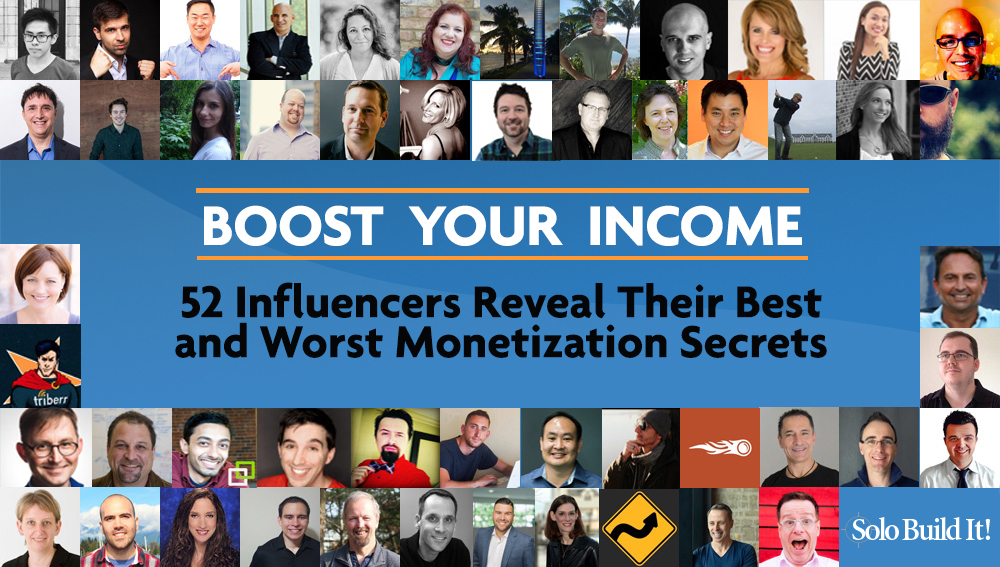
A goal is a dream with a deadline.Napoleon Hill
Making a living from our online business is a dream we all share. For many, that dream has become reality, but not without its fair share of struggles.
While we all have to explore our own potential and challenges, the good news is we don’t have to do it alone.
We’ve gathered over 50 experts — people who have demonstrated real success in their online businesses — and we asked them two simple questions. What has been your most effective monetization technique, and your least?
You’ll find their answers to be a tremendous collection of advice, anecdotes, recommendations and tips.
Interestingly, these experts come from so many different businesses, with varying goals and models, that they’re not all trying to monetize in the same ways. Some talk about the importance of content or relationships, while others talk about products or display ads.
The result is a breadth of monetization exploration never before seen in one article.
Before we get into all of this incredible advice, do yourself a favor and have everything emailed to you. We’ve put together a fantastic resource that you’re welcome to download for free, and refer to as often as you need to in order to keep your monetization on track.
Participating in this roundup are some of the best and brightest entrepreneurs and bloggers in the world, including:
If you’re interested in hearing what the experts had to say about specific monetization techniques, you can also use these handy selectors to filter down to only those whose Most Effective or Least Effective monetization techniques interest you:
Afterwards, we’ll review a few of the key points made and analyze what some of the most common responses were.
Let’s get started!
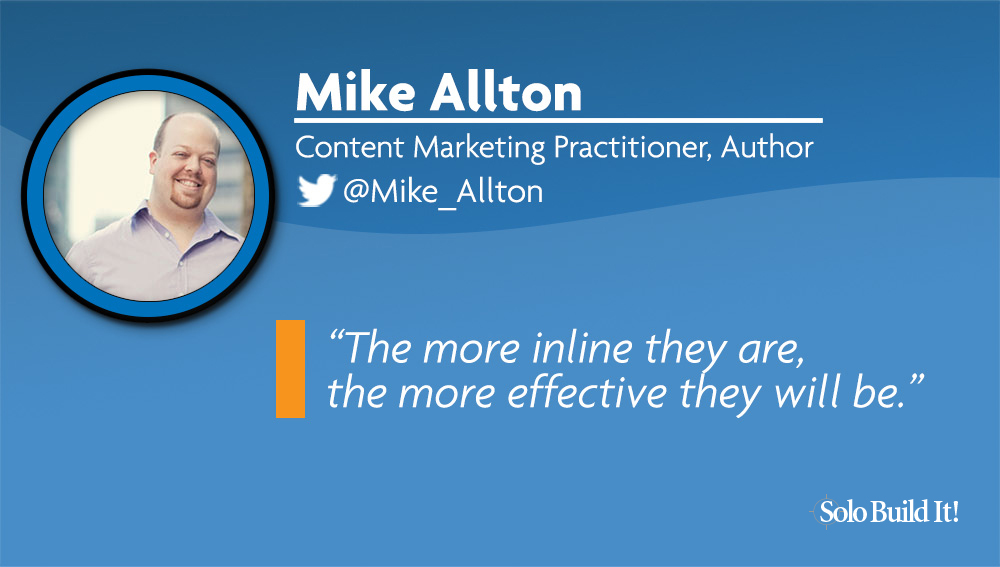 Mike Allton of http://www.TheSocialMediaHat.com
Mike Allton of http://www.TheSocialMediaHat.com
Content Marketing Practitioner, Author
What has been your most effective monetization technique, and why?
Anytime I have been able to create a one-to-one relationship with another brand and push forward with a marketing and monetization plan, that’s been the most lucrative.
Now, this is beyond just being an affiliate. I’ve spent incredible amounts of time creating articles designed to promote great products and services that I’ve enjoyed and want to share with my audience — and those have done OK.
But they pale in comparison to the times I’ve been able to work directly with a brand’s CEO or Marketing Manager and partner with them in the form of sponsored content, webinars, or even brand evangelism.
Those are the kinds of deals that certainly require a history of proven site traffic and social engagement, but once you build up your brand to that level, it’s a lot of fun and very profitable.
What has been your least effective monetization technique?
I’ve deliberately experimented with a lot of monetization techniques, particularly passive ones, so there have been quite a few that have resulted in terrible returns.
AdSense has never been fantastic for me, but there have been far worse techniques.
As a category, for me, the least effective monetization techniques have been “Related Content” — widgets that usually appear below existing articles on my site and recommend other (external) stories my readers might be interested in.
It’s a great concept, and I know it works well on larger, mainstream sites like CNN.com, but on my site the recommendations have always been too off-topic. Instead of showing 8 business- and marketing-related articles, the widgets include stories about celebrities, weight-loss, and other uninteresting content.
And so, not surprisingly, my readers don’t click on the articles. One service I tried, Nster, ran for about 3 months and resulted in approximately $0.06 in earnings. Six cents! That’s on a site that gets about 50k readers a month.
The silver lining here was that it underscored for me the importance of matching your monetization techniques with your target audience and content topics, even when you’re just starting a blog. The more inline they are, the more effective they will be.
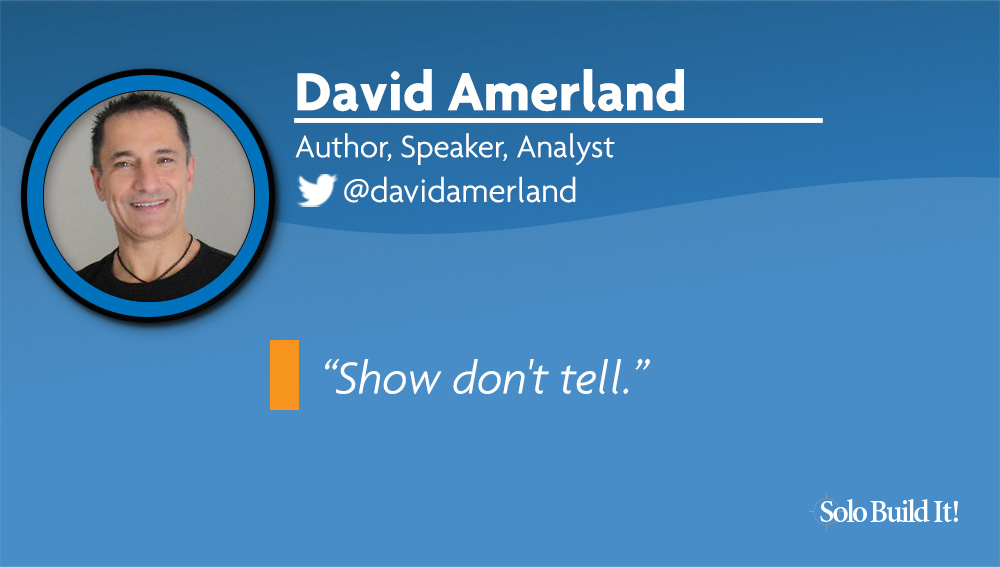 David Amerland of http://DavidAmerland.com
David Amerland of http://DavidAmerland.com
Author, Speaker, Analyst
What has been your most effective monetization technique, and why?
Show, don’t tell. When it comes to proving why one of my books will be great for a marketer or a webmaster to read, I always show exactly what the benefits are for those who will buy it by publishing detailed studies, case histories or research, and joining the dots. I never “bait,” in the sense that in each case what I put out is complete in itself and of direct use to those who read it or watch it (in the case of a video). The primary motive is to share knowledge, information, insights and tips that are valuable to my audience and can be applied quickly. The subsequent sale of a book, if it happens, is always secondary.
While, obviously, I need to sell books in order to make a living, having someone’s attention for a brief space of time should never be about selling or even marketing to them. It should be about creating a relationship where I serve a need they experience so they can solve the problem they have. Only after the value of this connection has been established can we possibly move onto what I do as a writer and speaker, and then it only makes sense to do so if my books or booking me to speak adds further value that will help them in their work.
What has been your least effective monetization technique?
A gift promotion. Back in 2010, as part of the marketing campaign for the very first edition of “SEO Help,” my publisher agreed to a $5,000 budget and we ran a gift promotion for confirmed purchases of the book. Basically those who bought the book had to email a receipt with their name to be entered in a giveaway that had over 100 prizes worth $50 or more. It was a disaster.
The promotion, as all such promotions, is basically a “we bribe you to like us” approach to marketing. It attracted a lot of attention for the prizes but did little in the way of creating awareness of me as the book’s author or foster any real relationship with the audience. There were a lot of people who bought the book just so they could take part in the competition and win a prize. So it was a success in terms of book sales, but from my perspective of near-zero value in terms of brand awareness (people getting to know me, as the author) and relationship-building.
That campaign drove home to me just how much the web has changed marketing and how little traditional marketing has taken this into account and adapted. It shaped much of what I do differently now in terms of building relationships with people as people first and discovering a potential readership as part of a much more real, long-term plan that creates a mutually beneficial solution.
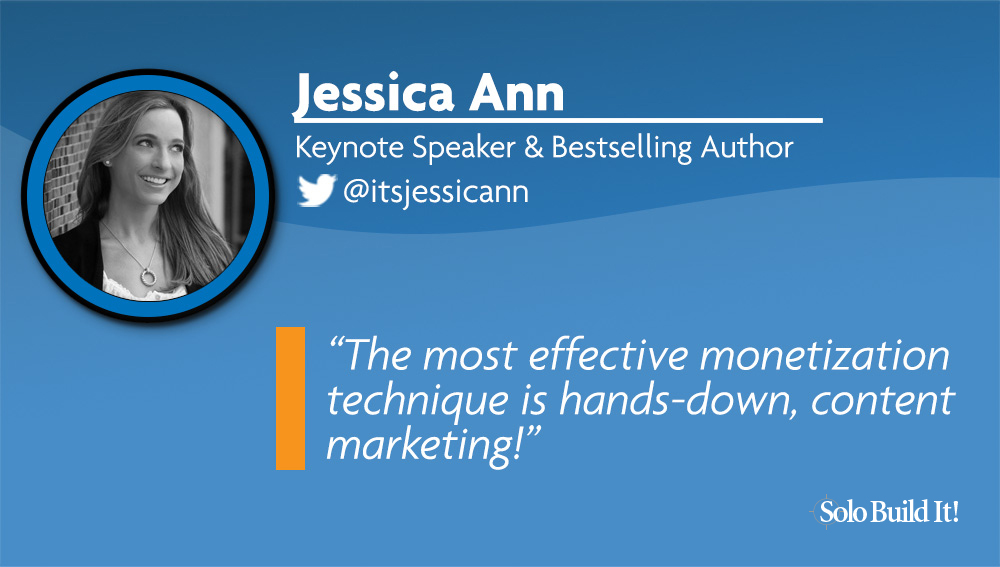 Jessica Ann of http://www.JessicaAnnMedia.com
Jessica Ann of http://www.JessicaAnnMedia.com
Keynote Speaker & Bestselling Author
What has been your most effective monetization technique, and why?
The most effective monetization technique is, hands-down, content marketing! I strive to always practice what I preach and truly believe in what I do. Content marketing has helped me to build a powerful blog, get paid to write on high-profile websites, and bring in an engaged audience.
While I did not see the results right away, the consistency to “show up and write” has changed my life. It gave me a voice when I felt isolated, and became the foundation to write my book, Humanize Your Brand. It’s connected me with amazing humans all over the globe. These humans often become loyal clients and trusted colleagues. Content marketing has shown me that monetization can happen when you show up as your true, (sometimes) messy, glorious self.
Content marketing is a real, relevant, and inspiring way to help your business to grow, bring in money, and allow your brand to endlessly be exposed to new audiences.
What has been your least effective monetization technique?
I pulled a rookie move in the early days of running my business: I would often do cold calls! Yuck. After a few calls, I quickly got burned out. It did not bring in any business and it left me feeling slimy. As a new business owner I thought that this was what “I had to do.” Not only did it not work, it made me feel hopeless and like my business did not matter: Double yuck.
The thing is, you have to always provide value. If you’re cold calling, you’re asking potential customers to provide you value right away — on your time. Depending on your industry, cold calls are often regarded as an outdated and obnoxious approach to business. I quickly learned that I could not sustain my business this way, which is one of the many reasons why I began writing on my website. I channeled my anger, frustration, and disappointment into content marketing so that the information could exist on my website in a more quiet, yet effective way.
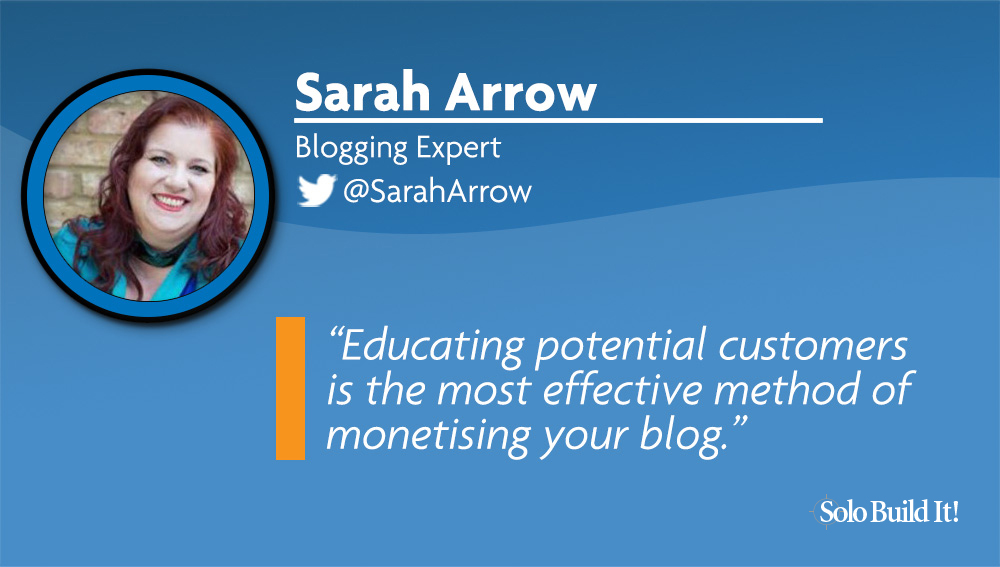 Sarah Arrow of http://www.SarkEmedia.com
Sarah Arrow of http://www.SarkEmedia.com
Blogging Expert
What has been your most effective monetization technique, and why?
Educating potential customers is the most effective method of monetising your blog. When you show someone how to do something you build trust. And when readers have enough trust and can see you know what you’re doing they’ll book you. This means you need to create the blog posts that support the buying cycle of your prospects. It’s not only awareness content that you create, but content that facilitates making the right decision.
This means content like buyer’s guides and comparative reviews can help readers make better decisions around purchasing your services. Quizzes can help them understand their own needs, and content upgrades attached to this type of content will enable you to show your prospects that you know what you’re doing.
If you don’t have your own product or service with which to monetise your business blog, then the product demo is your best friend. When you partner with someone as an affiliate you can demo the product to your audience. If you do an effective job of understanding your audience, your product demos can be backed up with product reviews in order to monetise your site.
What has been your least effective monetization technique?
AdSense! I cannot understand how bloggers make a fortune from displaying other people’s offers in their content. To me it defeats the purpose of blogging for business. If you have a product or service, and you know who the audience is, then skip the ads and create the right content.
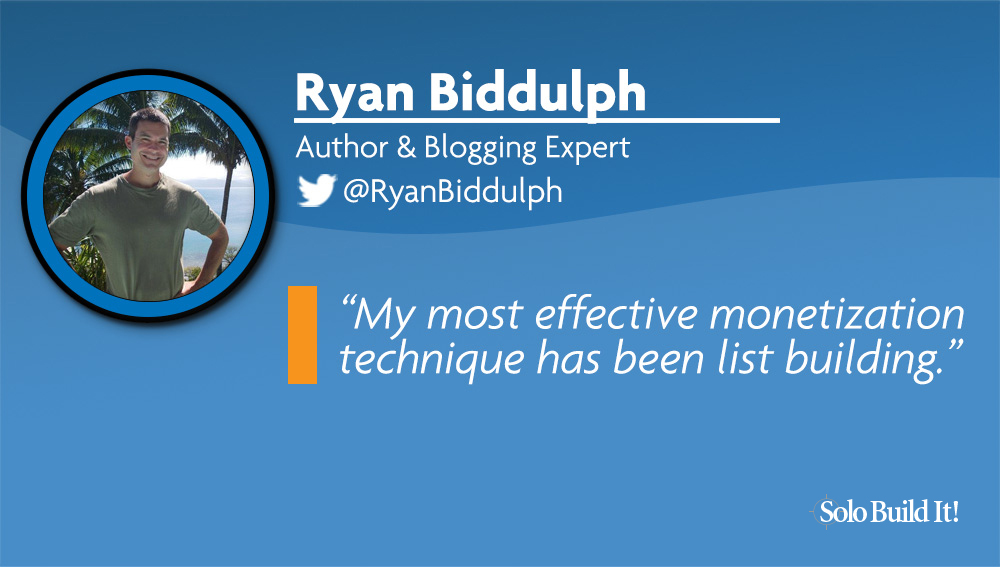 Ryan Biddulph of https://www.BloggingFromParadise.com
Ryan Biddulph of https://www.BloggingFromParadise.com
Author and Blogging Expert
What has been your most effective monetization technique, and why?
My most effective monetization technique has been list-building. Like the conduit through which money flows, I sell whatever I promote through my email list. The income channel matters not; building my list, keeping my subscribers engaged, and helping them with my products and services has worked nicely for me.
What has been your least effective monetization technique?
My least effective monetization technique was any strategy I didn’t get clear on. By this, I mean any strategy I worked primarily to make money with. Which attached me to outcomes. Which killed my creativity. Which made it really hard for me to net a steady income through those channels.
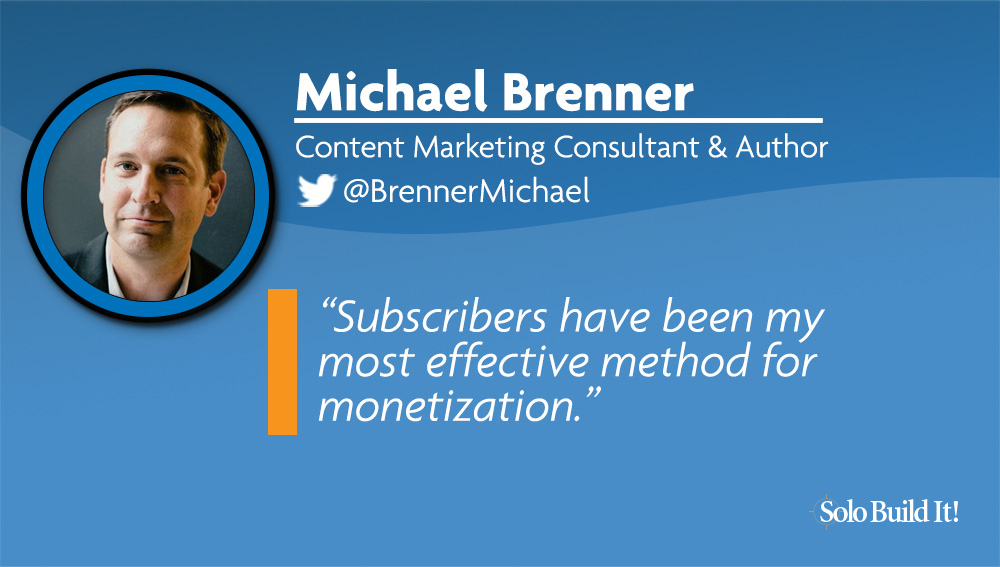 Michael Brenner of https://MarketingInsiderGroup.com
Michael Brenner of https://MarketingInsiderGroup.com
Content Marketing Consultant and Author
What has been your most effective monetization technique, and why?
Subscribers have been my most effective method for monetization. But this requires follow-up programs and email nurturing of other offers.
What has been your least effective monetization technique?
Banner ad links to product pages or other promotional offers.
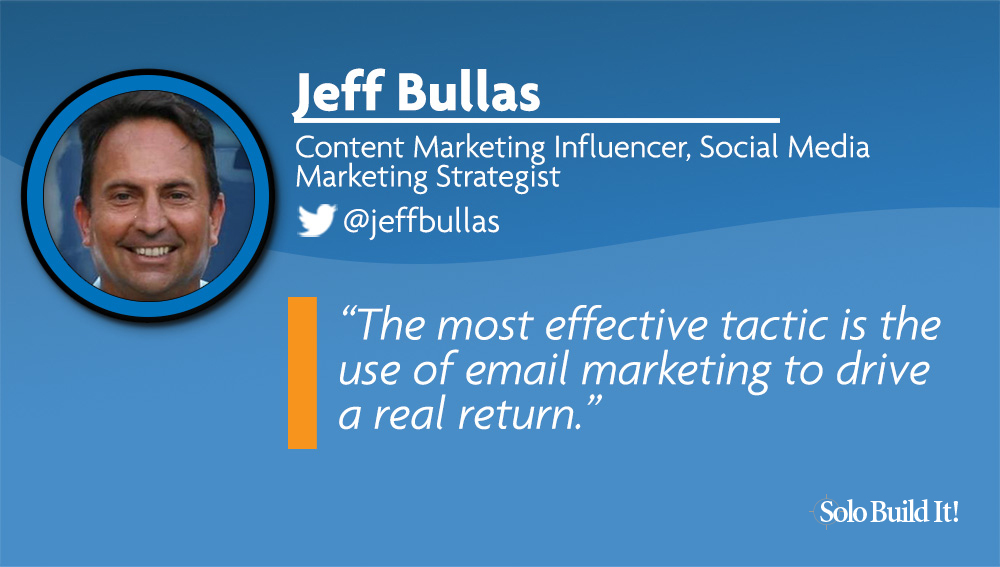 Jeff Bullas of http://www.JeffBullas.com
Jeff Bullas of http://www.JeffBullas.com
Content Marketing Influencer, Social Media Marketing Strategist
What has been your most effective monetization technique, and why?
The most effective tactic is the use of email marketing to drive a real return. The reason it is effective is that people may engage and share on social, but they will buy from a sequence of emails that educate first and sell second.
What has been your least effective monetization technique?
Banner ads that are based on revenue per click have been the least effective. The rate of return from banner blindness doesn’t make the best use of the blog’s real estate.
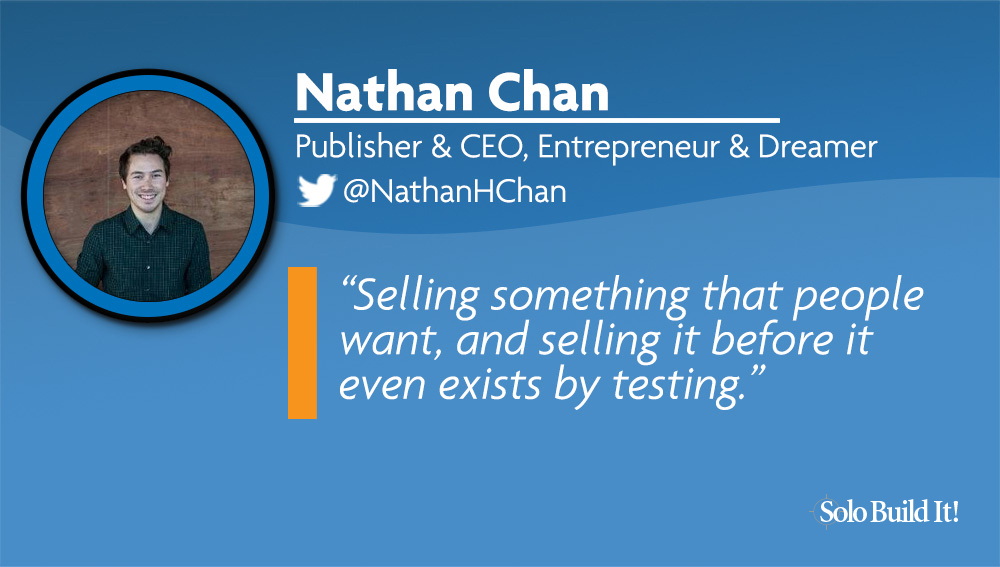 Nathan Chan of http://FoundrMag.com
Nathan Chan of http://FoundrMag.com
Publisher & CEO, Entrepreneur and Dreamer
What has been your most effective monetization technique, and why?
Selling something that people want, and selling it before it even exists by testing.
What has been your least effective monetization technique?
The opposite, creating something that I think people will want, but haven’t tested it.
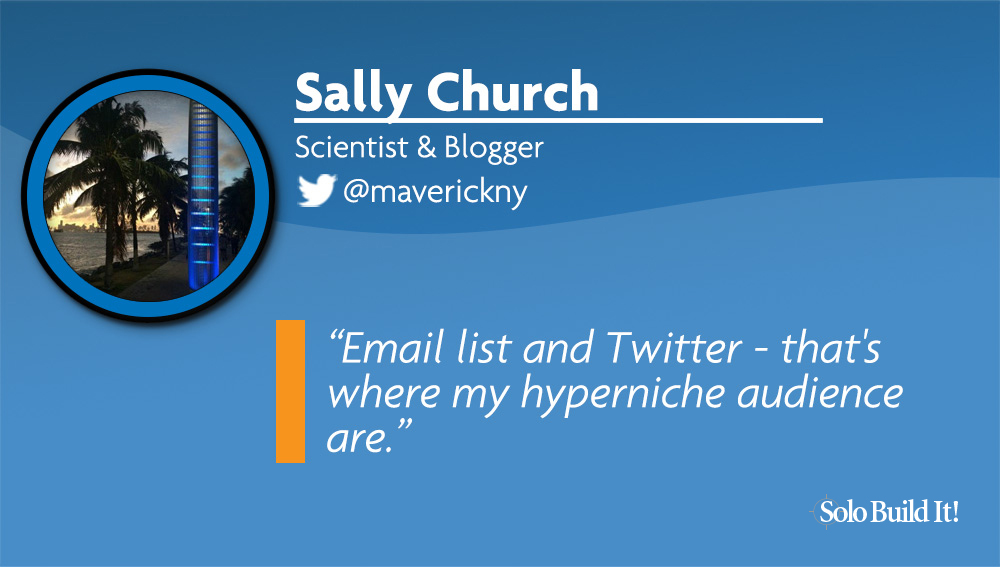 Sally Church of http://BioTechStrategyBlog.com
Sally Church of http://BioTechStrategyBlog.com
Scientist and Blogger
What has been your most effective monetization technique, and why?
Email list and Twitter — that’s where my hyperniche audience are.
What has been your least effective monetization technique?
Live events/workshops — very little ROI due to the need to build long-term trust/relationship.
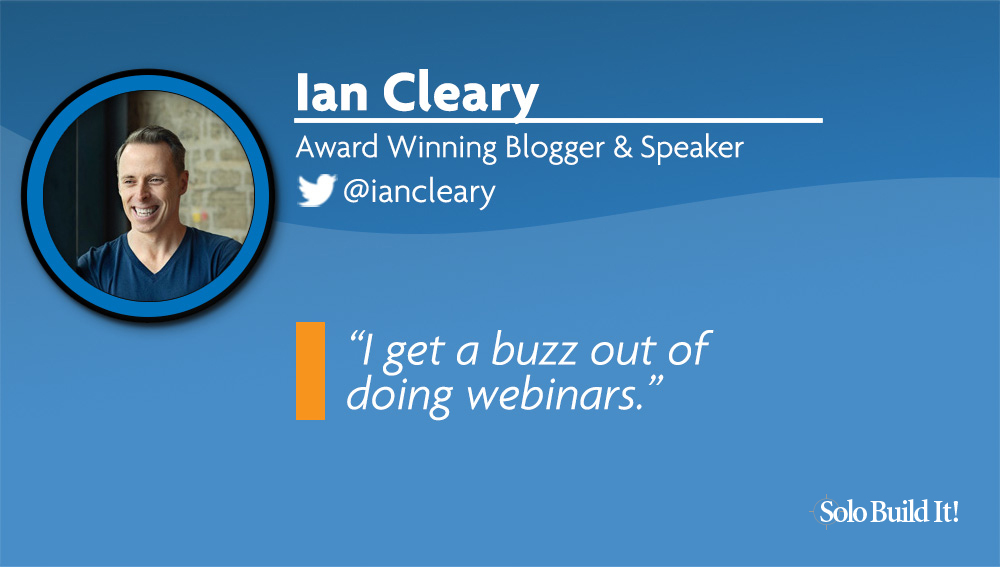 Ian Cleary of http://www.RazorSocial.com
Ian Cleary of http://www.RazorSocial.com
Award Winning Blogger and Speaker
What has been your most effective monetization technique, and why?
We’ve done well selling on webinars. I get a buzz out of doing webinars and I share some great content but also have a bit of fun. This keeps the audience interested and more stay around for the sales bit at the end.
What has been your least effective monetization technique?
We tried doing a $1 trial for our monthly subscription training club (RazorBlazers) and over 70% of people didn’t convert to being a full member.
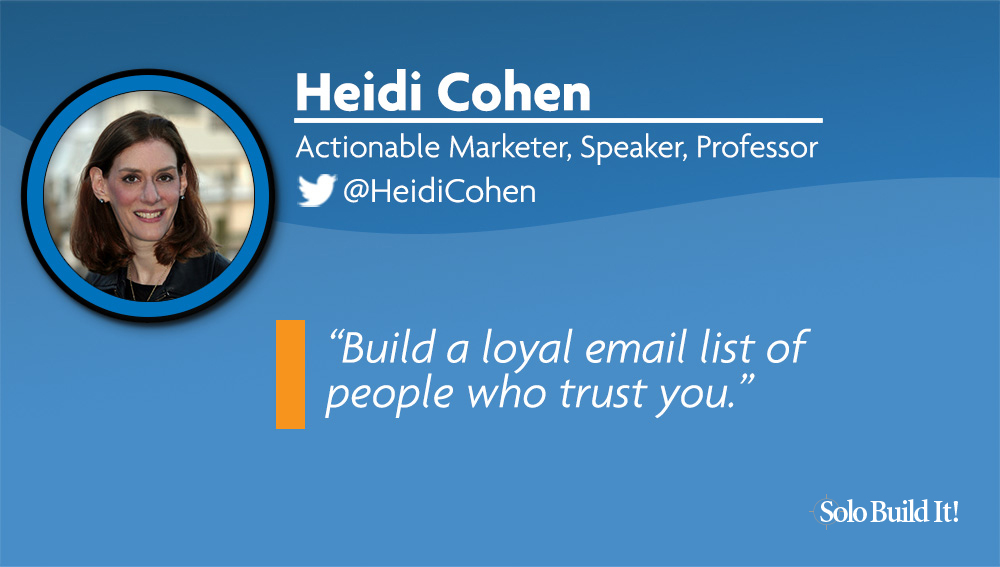 Heidi Cohen of http://ActionableMarketingGuide.com
Heidi Cohen of http://ActionableMarketingGuide.com
Actionable Marketer, Speaker, Professor
What has been your most effective monetization technique, and why?
The consistently best technique for monetizing your blog is to build a loyal email list of people who trust you. Like many things in life, it’s not about size. It’s about quality and relationships.
To this end, you must have a blog mission statement that’s aligned with your business and marketing goals and related branding guidelines. Then you must really know your readers and walk in their shoes to understand the type of content they actively seek.
Last, you must create quality 10X content that provides relevant product information, answers customers’ questions, shows customers how to use your products, explains how to style your product, or shares ratings and reviews.
What has been your least effective monetization technique?
A “spray and pray approach” to your blog audience, especially through poorly targeted sales emails and irrelevant ads, is the worst way to monetize your blog. Even worse, it can destroy your email list by causing people to unsubscribe or report your emails as spam.
You must build relationships with your audience and prove that you’re the person they should trust and buy from. This requires quality content.
Content Marketing Institute’s Joe Pulizzi says that “B2B blogs fail because they push for the sale.”
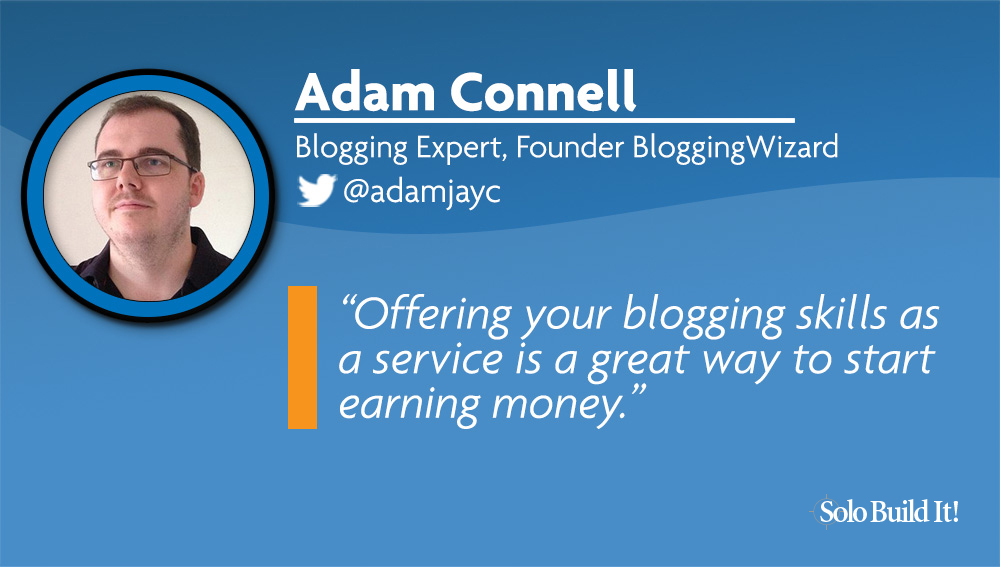 Adam Connell from https://www.AdamConnell.me
Adam Connell from https://www.AdamConnell.me
Blogging Expert, Founder, BloggingWizard
What has been your most effective monetization technique, and why?
I’ve found offering services to be extremely successful. When we first launched UK Linkology, we were able to scale to 5 figures/month within 3-4 months just by publishing helpful content and writing for other sites. I spent about a day or so on the marketing each month.
Even though (at the time) I was writing guest posts for large industry publications that referred VERY little traffic, the traffic that we did get was super engaged and converted well.
So, if you’re just starting out as a blogger, offering your blogging skills as a service is a great way to start earning money. If you can get to the point where you can plug more people into your business, you’ll be able to scale faster. The key is to work towards working on your business, not in your business.
What has been your least effective monetization technique?
Ads. I tried them in the past without much success, but there are a few reasons why:
I didn’t have enough traffic, and ads in general aren’t used much in my niche. Also, I think part of me didn’t want them to work because by optimizing ad revenue you have to ruin user experience. That said, they work well for some.
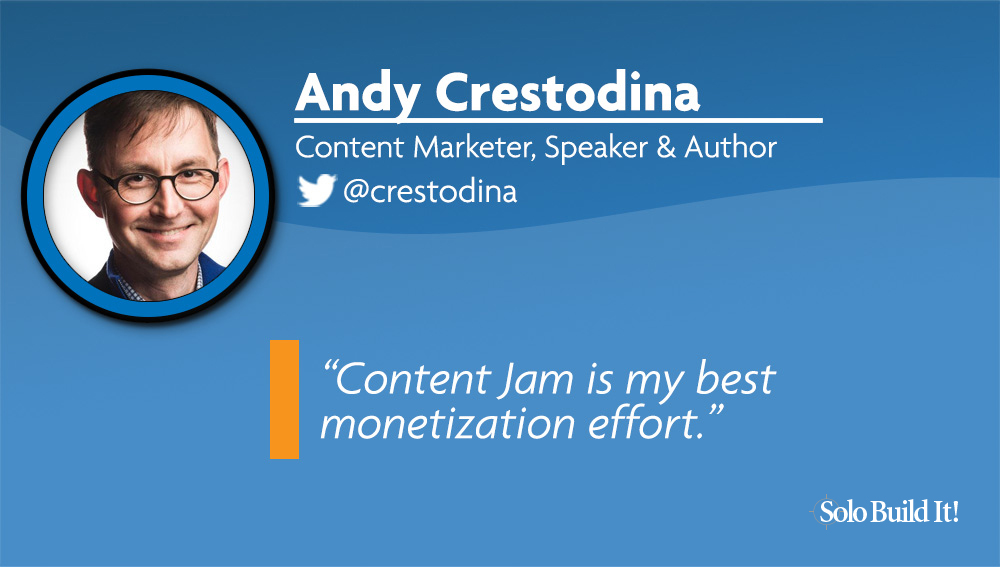 Andy Crestodina of https://www.OrbitMedia.com
Andy Crestodina of https://www.OrbitMedia.com
Content Marketer, Speaker and Author
What has been your most effective monetization technique, and why?
Content Jam is my best monetization effort. It’s our annual conference. Like any event, it’s not cheap to do it right. The food and beverage? $50,000. And we pay all of those costs before we sell the tickets. It’s an act of faith.
But the event is a huge hit. A-list speakers in a beautiful venue, right downtown on the Chicago river. It sells out every year and the rooms are packed with 300 marketers, prospects and fans. It’s like a little holiday. Some people come year after year.
The indirect benefits are amazing. It has a huge impact on brand awareness, lead gen and the sales funnel. But it’s also profitable. The event pays for itself and then some. It’s a profitable little venture.
What has been your least effective monetization technique?
My book, Content Chemistry, is for sale everywhere books are sold. And it sells a few copies every day. People buy it on Amazon, write reviews and refer it to friends. Universities use it as a textbook. Events order it for all attendees. People love it…
“The book is extremely well researched and ingeniously presented. It includes clear explanations of things like search engine optimization, social media, and email marketing. The book, which is refreshingly concise, is laid out like a chemistry textbook and carries that narrative, but in a fun and informative way.”
Does it translate into results? Yes and no. It’s a successful sales tool, networking tool, personal branding tool …but for monetization? Not really. It’s a $20 business card.
Because it’s an “illustrated handbook” it had to be lovingly designed and printed in full-color. The costs are high. Despite the strong sales, I have yet to see a check from this effort. Not my best monetization effort.
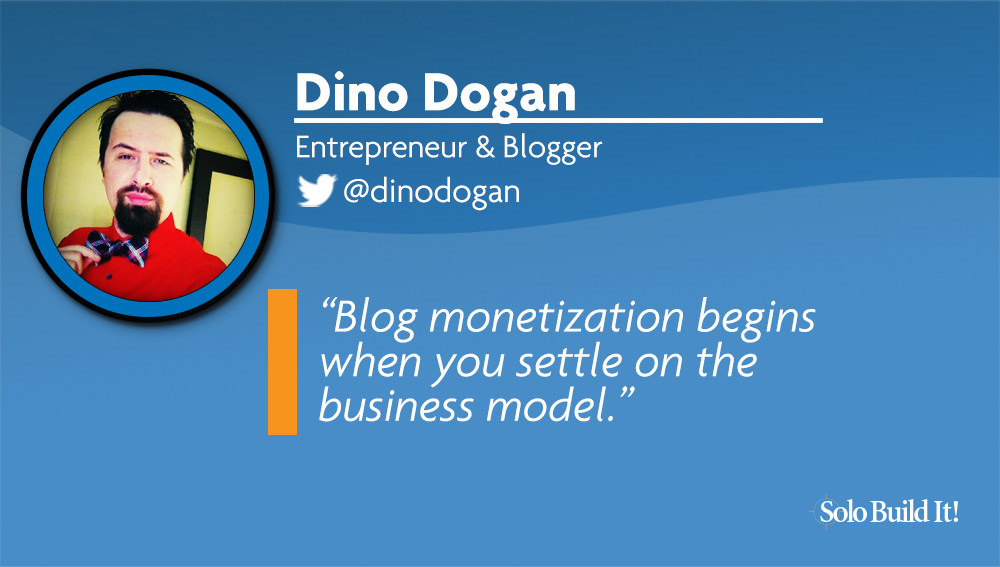 Dino Dogan of http://MadeInNYC.com
Dino Dogan of http://MadeInNYC.com
Entrepreneur and Blogger
What has been your most effective monetization technique, and why?
The best traffic strategy for me was Twitter and blog comments.
Blog monetization begins when you settle on the business model. The good news is that there are only 3 business models, so picking one shouldn’t be hard.
- Ads
- Subscriptions
- Transactions
Making one of these models work may prove to be a bit of a challenge, but I believe in you.
Ads
Ask yourself, do you have enough traffic to get someone to pay you for impressions?
You’ll need millions of impressions in order to compete effectively in the ad game. How many visits do you get per day? Few hundred? Few thousand? You’re a long way away from making a living with blogging. At best, you may be able to finance your coffee addiction. Which is not a bad goal to have, come to think of it.
Subscriptions
Are you churning out content people are willing to pay for? Before you say “of course I am, I just need more people to see my stuff,” bear in mind that some of the biggest publishers in the world are having a hard time getting their readers to pay for content.
Ask yourself, “If New York Times is not able to convince its customers to pay for content, what competitive advantage do I have? ”
The answer might be “I’m in a very narrow niche and I’m a well known expert and my audience is hanging on my every word and I don’t have the overhead New York Times has so I don’t need to make as much.”
If that’s so, then you may be on to something. But short of that, you’ll have a hard time getting paid subscribers because opinions and expertise have been rendered virtually worthless (pun intended).
Transactions
Last but not least, transactions. Got something to sell? Great! Use content to drive that sale. Of course, if you have something to sell, perhaps content is not even necessary. You could buy Google or Facebook ads and accomplish the same thing.
I’ve used my blog to drive customers to my platform where we would give mostly everything away for free. Once my blog readers were converted into members of my company’s platform, we monetized through transactions and subscriptions.
What has been your least effective monetization technique?
The worst traffic strategy for me was Twitter and blog comments.
Things change and what works today will not work tomorrow. To monetize your blog you have to stay focused on your business model and look at the right metrics. Hint: Shares and likes ain’t it.
Happy blogging.
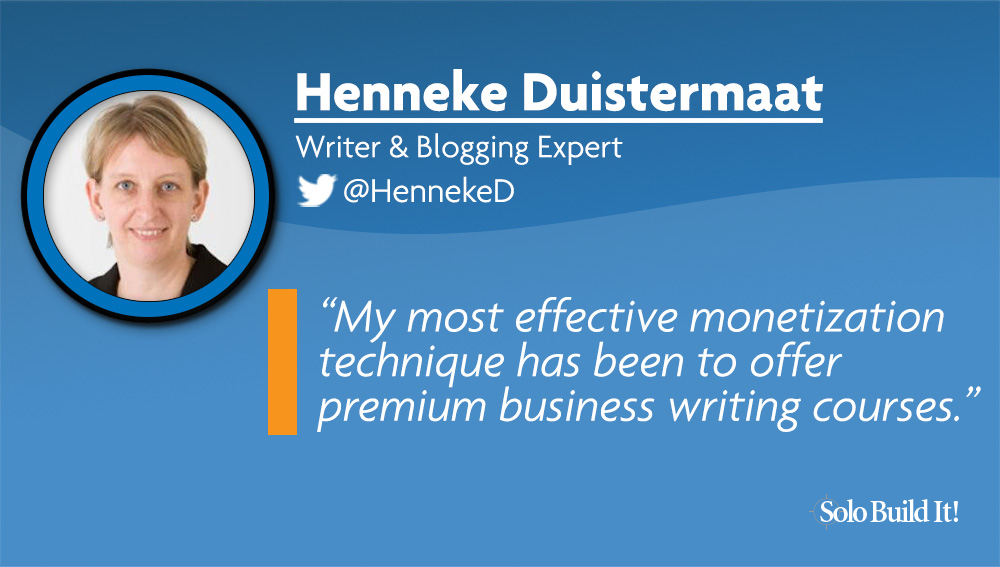 Henneke Duistermaat of http://www.EnchantingMarketing.com
Henneke Duistermaat of http://www.EnchantingMarketing.com
Writer and Blogging Expert
What has been your most effective monetization technique, and why?
My most effective monetization technique has been to offer premium business writing courses. Not only do my two courses bring in most of my revenue, I also love doing the courses as I work with small groups of people and I can see how the course helps people find their voice and become more confident writers. Making monetization choices is not just about what brings in most money, it’s also about what I’d love to do most and what feels most fulfilling.
What has been your least effective monetization technique?
I’ve kept my business focused, so I’ve not tried a lot of other monetization techniques. My ebooks bring in a steady passive income stream and help people with their writing for a relatively low price. They’re also a good way for people to get to know my work before committing to an intensive course.
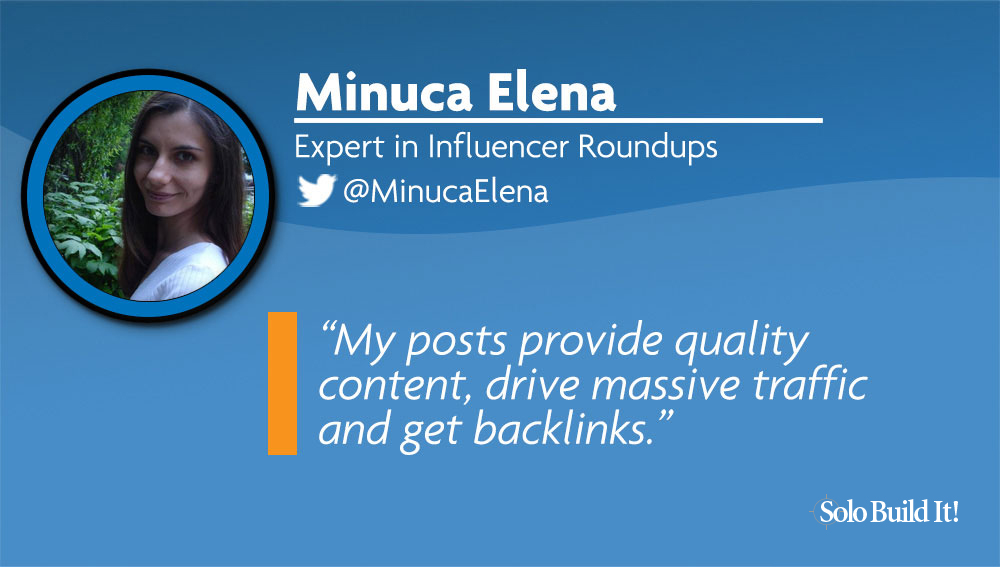 Minuca Elena of http://MinucaElena.com
Minuca Elena of http://MinucaElena.com
Expert in Influencer Roundups
What has been your most effective monetization technique, and why?
My most effective monetization technique is creating expert roundups for clients. My posts provide quality content, drive massive traffic and get backlinks. This type of post is a premium service because the results are much better than for a regular post.
Through roundups you can connect with influencers, which can result in getting guest posts for authority sites, being featured in interviews and podcasts, and also getting more clients for products or courses.
Expert roundups work great in any type of niche. I’ve done such posts on topics like blogging, gardening, cycling, food, sex therapy, parenting and others.
You can see here an example of an expert roundup that I am particularly proud of. This post got over 800 shares, dofollow backlinks from 16 referring sites. It ranks for 69 organic keywords. My client was so thrilled with the result that he hired me again for a new expert roundup, which I am working on right now.
What has been your least effective monetization technique?
I couldn’t say what was my least effective monetization technique because ever since I started working online, I have only done roundups. I became a full-time freelancer immediately. I think that it is good to have multiple income streams. This is something that I’m planning.
I want to be able to make a change from a service-based business to a more passive income.
Growing an email list can be difficult, but after a while, it can be very rewarding. It’s nice to create an eBook or a video course now and get paid many times for the same work.
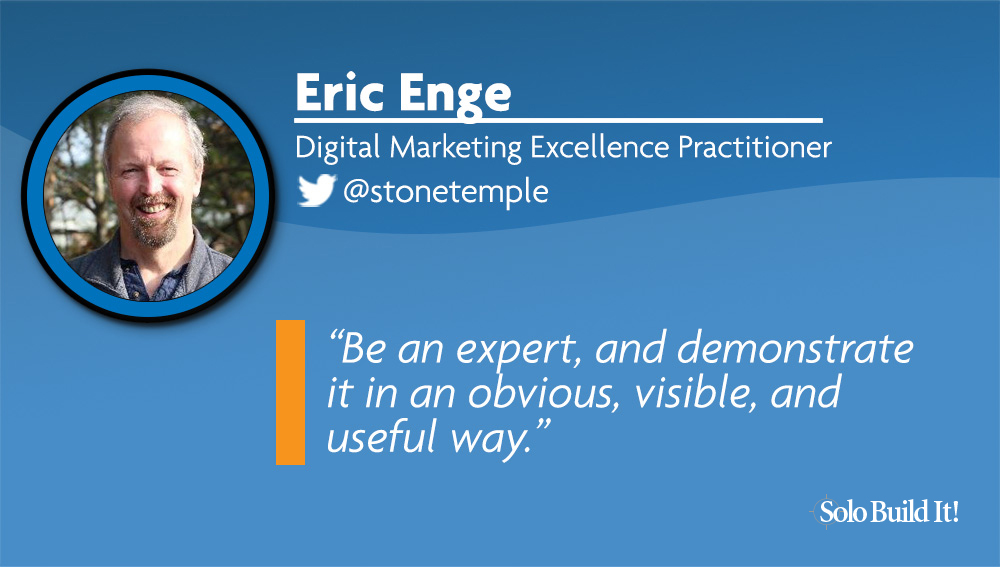 Eric Enge of https://www.StoneTemple.com
Eric Enge of https://www.StoneTemple.com
Digital Marketing Excellence Practitioner
What has been your most effective monetization technique, and why?
The number one monetization technique for us has been speaking at conferences. Having a physical presence there, and being seen there, has been huge. However, this has been greatly enhanced by two other components:
- Executing our studies and publishing the results.
- Active engagement in social media.
There is a lot of interaction between these things. For example, the studies make it easier to get speaking slots at conferences. Social media helps make the studies more visible, and that visibility makes their impact on our chances of speaking at conferences go up. You get the idea.
So let me summarize this in a simpler way — be an expert, and demonstrate it in an obvious, visible, and useful way.
What has been your least effective monetization technique?
Simple broadcasting. Just yelling louder doesn’t work very well. It may be that it used to, but I find that everyone you’re trying to reach is so busy these days, they’re highly efficient at tuning out noise. Your task is to figure out how not to be seen as noise. Once you have that down you’re in good shape.
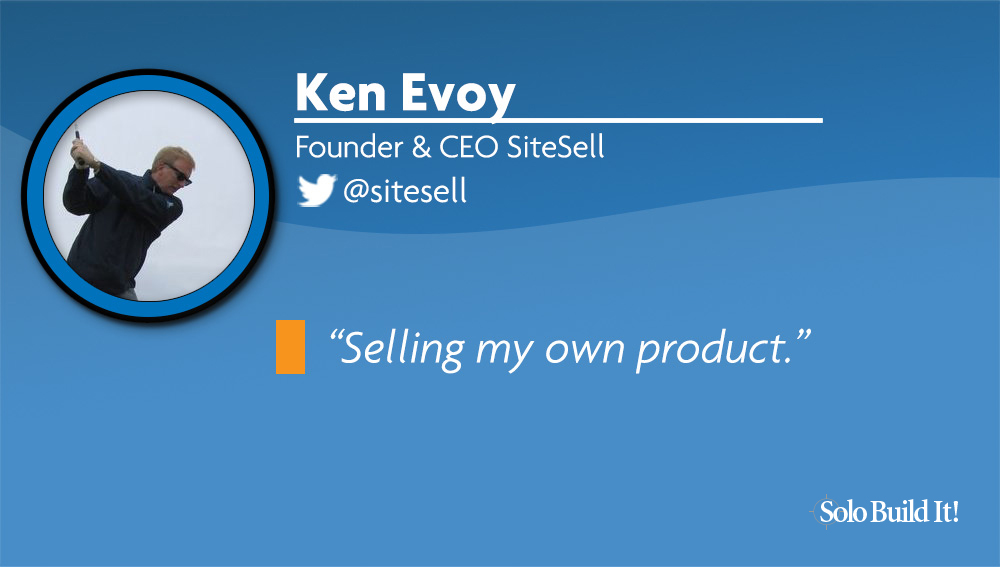 Ken Evoy of https://www.sitesell.com
Ken Evoy of https://www.sitesell.com
Founder and CEO, SiteSell
What has been your most effective monetization technique, and why?
Over the past 20 years, I’ve started 3 different online businesses and monetized the same way every time…
Selling my own product.
The first product was a niche-investing “info-product” (combination book and software) that enabled people to capitalize upon the predictable but counterintuitive psychology of speculating in junior mining stocks. It was something I had done personally and profitably for years, but grew bored with.
Back then (1996), the viability of e-commerce had yet to be established. I wondered if it was possible to sell online. The challenge of selling something excited me.
After figuring out SEO, learning copywriting, and completing the ebook and software, all was ready. In 18 months, we sold the self-imposed limit of 1000 copies at $1000 each (each copy numbered from 1 to 1000, customers including their identification numbers in the forums to prove each number was unique).
We formed SiteSell to market what we had learned in the real world as a book called “Make Your Site SELL!.” The Bible of its time, we sold 150,000 digital copies and 15,000 hard copies (before vowing never to ship a molecule again — what a headache). That led to “Make Your Knowledge Sell!” and a branded line of “Make Your ____ Sell!” books.
People loved the books, but a survey showed us that few were actually using the books to build businesses. The reason reminded me of the first product — a combination book and software. And so SBI! was born.
15 years later, this combination of Action Guide (information in a step-by-step process) + software (from keyword brainstormer to sitebuilder) + guidance (via the “help and be helped” SBI! Forums and the online help and in-house articles) continues to deliver unmatched rates and levels of success.
The monetization lesson? Sell your own product. Building on the platforms of others can be a risky model — rules and fees change (e.g., eBay, affiliate programs, AdSense). Many solopreneurs believe they have little choice due to a lack of time.
It does indeed take more time to create/develop/market/sell/support your own product. That’s what outsourcing is for.
That said, many solopreneurs treasure the “solo” in that term. They don’t want to manage people or worry about having customers. For them, passive monetization is fine, even if it does not build the same level of income per 1000 visits.
But if you want to maximize income and equity (the value in your business should you ever decide to sell it), develop and sell your own product. You are also in control, less susceptible to the whims of BigCo monetization systems, and able to extend and grow your product line as you see fit.
What has been your least effective monetization technique?
Although I have never monetized in any other way, I can share the experience of SBI! users. Our customers follow a process that we call C T P M (Niche-based Content builds Traffic, which becomes PREsold on you and finally Monetizes).
In its earliest iteration, SBI! focused on converting search-driven traffic into affiliate income. Successful from its very first days, SBI!’s growth accelerated when Google introduced AdSense in 2006. This was an exciting complement to affiliate income.
Thinking back to those days, it’s a little sad to see what a Trojan horse it has become, with regularly issued rules on what the site owner can and can’t do, while placing ads that some owners find offensive (it’s not up to Google to make it obvious how to opt out of those often ugly and irrelevant-to-the-site content ads, right?).
By 2010, we noticed that people were using SBI! to sell their services and even their own products. A business that started from scratch, like decksgo.com, shows how much more income and equity your own product can deliver.
From that point on, SBI! became more and more of a business-builder, differentiating it from sitebuilding, which is just one of the many steps involved in building a successful business.
Ironically, SBI! ends up where I started with my very first product, recommending folks create their own product. In fact, we just wrote an entire book that covers this for SBI! owners (“Make It!”), from brainstorming to sourcing and customer support.
If you don’t have the time or inclination, passive monetization has become the go-to. But with the increasing disadvantages, the best model for successful solopreneurs is active monetization via products. Higher paying than passive, and you remain in complete control of your business.
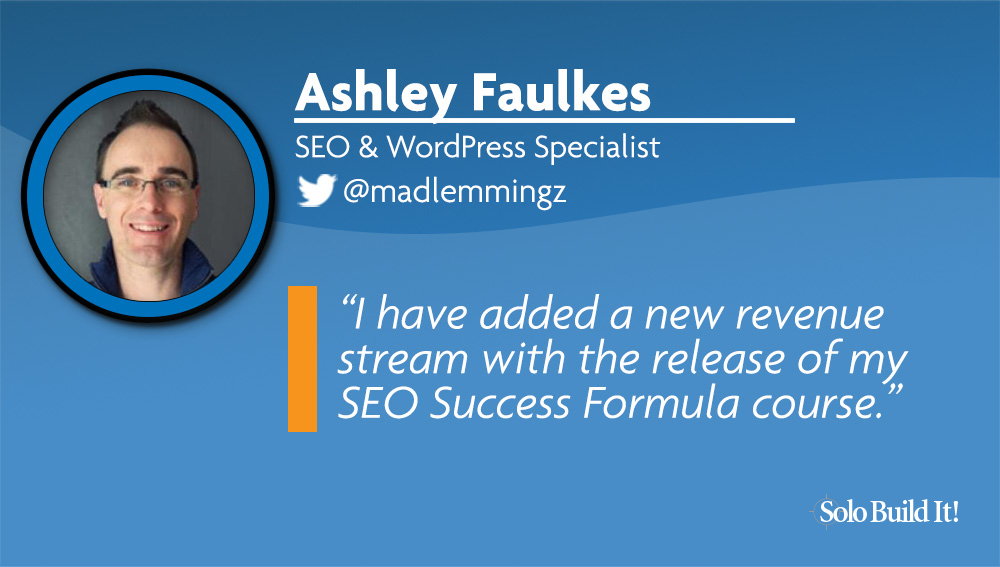 Ashley Faulkes of http://MadLemmings.com
Ashley Faulkes of http://MadLemmings.com
SEO & WordPress Specialist
What has been your most effective monetization technique, and why?
In the beginning, being an affiliate for various products was the most successful way to earn money on my blog. But when I wanted to make it a full-time income source, I had to supplement that with SEO and WordPress services. That has allowed me to live off my website and run my business from anywhere in the world.
More recently, I have added a new revenue stream with the release of my SEO Success Formula course that helps bloggers and business owners learn how to really do SEO today and get great results. Although this only just recently launched, it is already set to become one of my main income streams for years to come.
What has been your least effective monetization technique?
Personally, I find that making random or pushy offers to my list to be the least effective way to make money online. Instead, it is better to have an offer (my own, or someone else’s) that is either a logical choice to solve a problem or as part of a bigger blog post or review.
People require time to get to know you, a product or offer and then purchase. Even with smaller offers (not $5, but say $97). So keep that in mind when deciding what and how to sell.
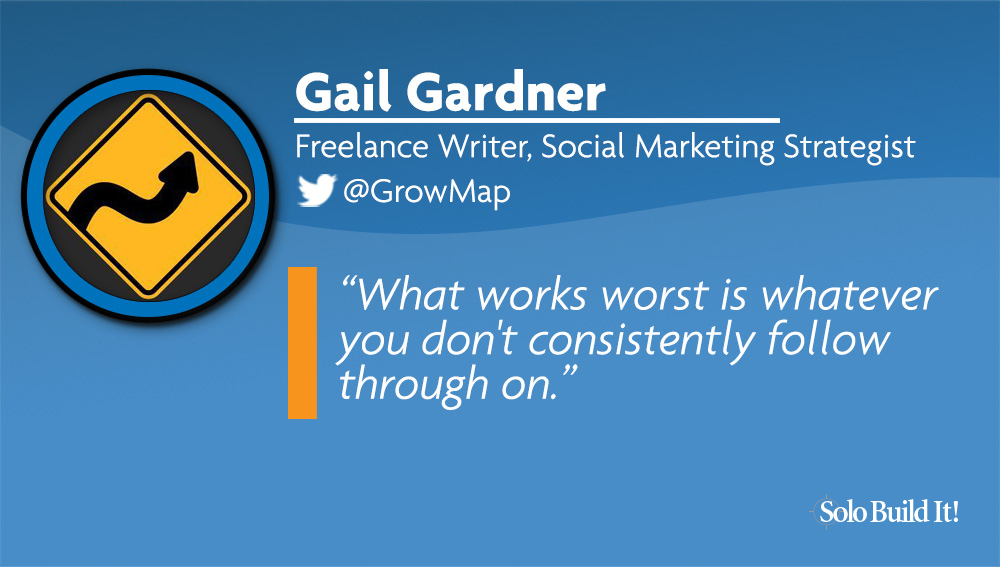 Gail Gardner from http://GrowMap.com
Gail Gardner from http://GrowMap.com
Freelance Writer, Social Marketing Strategist
What has been your most effective monetization technique, and why?
What brings me the most leads is contributing content on major sites that are very selective in what writers they are willing to publish. Because sites like AllBusiness and SmallBizTrends have very large audiences in my niche, being published there brings consulting leads that haven’t found me in my circles on Twitter.
What has been your least effective monetization technique?
What works worst is whatever you don’t consistently follow through on. For example, I thought Clarity.fm would work well and I did get a paid request there. However, that came because I was actively answering questions on that platform. So whatever you choose to try, you have to put continuous effort into maximizing.
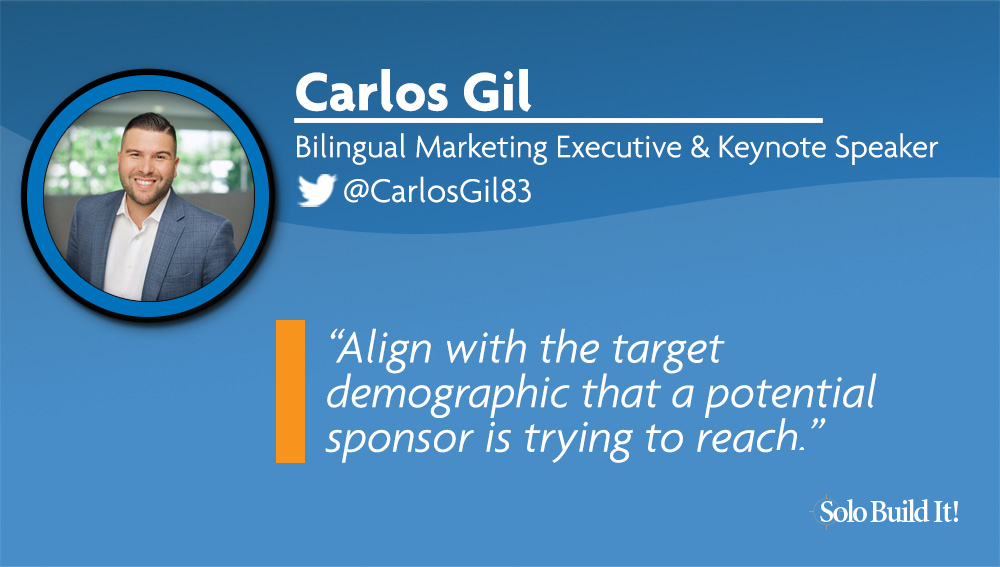 Carlos Gil of http://CarlosGil.biz
Carlos Gil of http://CarlosGil.biz
Bilingual Marketing Executive and Keynote Speaker
What has been your most effective monetization technique, and why?
Leveraging my social media reach across channels, including my email list, has proven to be an effective means of generating sponsorship opportunities since my # of followers (or views on Snapchat) is what grabs the attention of an advertiser more so than using my blog or website content as an asset. Also, ensuring that the content I create aligns with the target demographic that a potential sponsor is trying to reach.
What has been your least effective monetization technique?
Not knowing how much to charge can make one look very amateur. Have a rate card with three tiers for potential sponsors to choose. I learned the hard way early on that if you don’t have a menu for advertising to pick from you will end up working for a lot less than what you’re truly worth.
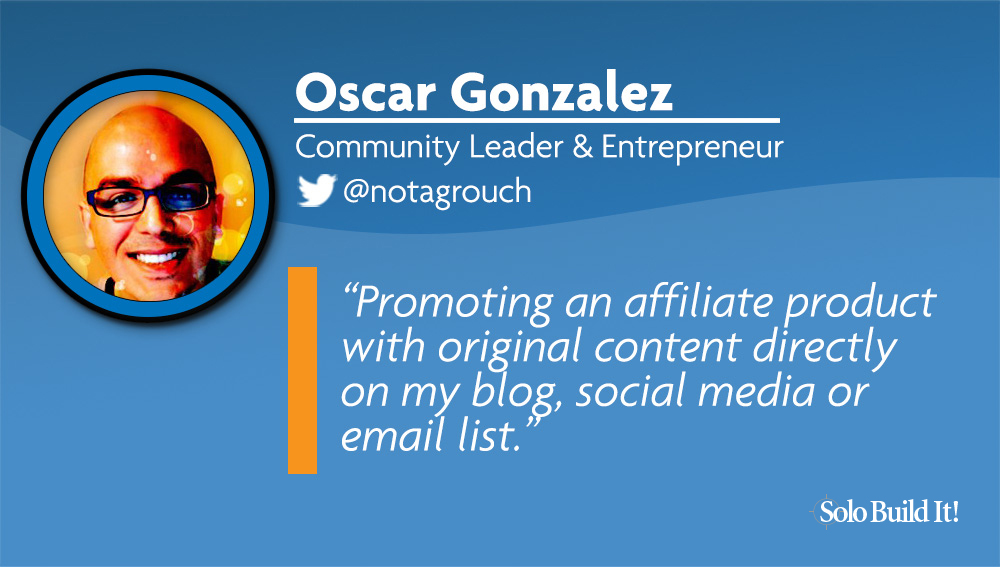 Oscar Gonzalez of http://NotAGrouch.com
Oscar Gonzalez of http://NotAGrouch.com
Community Leader and Entrepreneur
What has been your most effective monetization technique, and why?
The most effective monetization technique by far has been promoting an affiliate product with original content directly on my blog, social media or email list. By providing my readers with valuable content about said product, I educate them and I build a bond of trust and familiarity with them.
When they decide it’s time to buy the product, they will usually buy it using my links or in many cases, they’ll buy the product immediately after reading one of my blog posts about it. The key to this technique is consistency and deep coverage about a product so that readers become familiar with the product and search engines recognize that there is a lot of content about the product on the blog.
What has been your least effective monetization technique?
Banner ads have been so far the least effective technique for me. Things like AdSense or Switchads do not generate any significant revenue for me. I believe these are out-of-date methods that aren’t very effective because people tune them out. Another negative side of this technique for me is that people will click away from my blog to some other property online, potentially costing me hundreds of dollars in exchange for a few pennies. It’s just not worth it when trying to build a long term trustworthy brand.
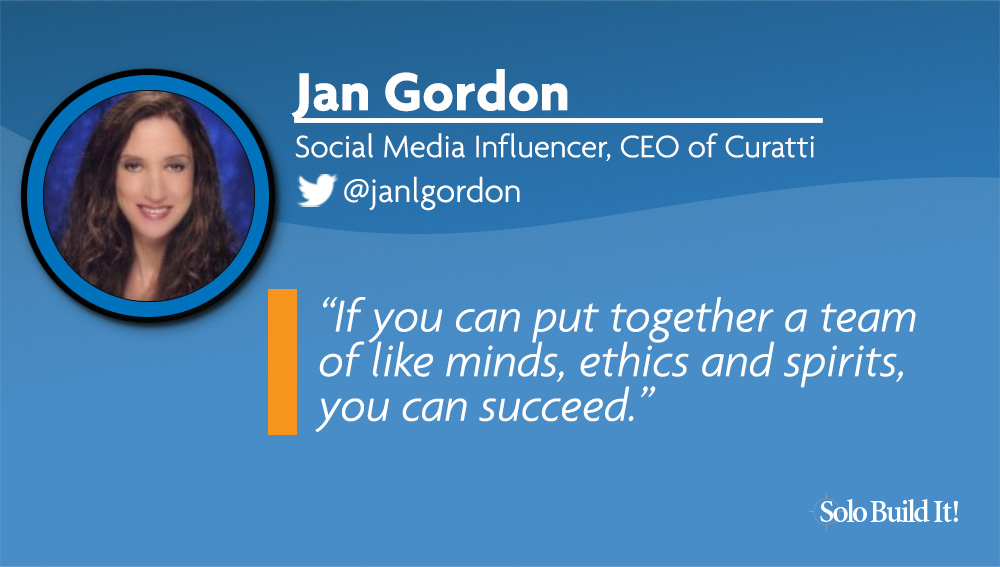 Jan Gordon of http://Curatti.com
Jan Gordon of http://Curatti.com
Social Media Influencer, CEO, Curatti
What has been your most effective monetization technique, and why?
Maybe my case isn’t typical, but maybe it is. My most effective monetization technique has been through relationship-building and letting things happen organically. Until now, I’ve never actively sought business (that is soon to change). And what has come my way has not necessarily been what I might have imagined (or from whom I imagined it!).
What has been your least effective monetization technique?
My least effective monetization technique is perhaps more common. Trying to deal with inquiries from businesses with sufficient layers of bureaucracy that I’m never working with decision-makers. Also not unusually, I have learned more from the latter category.
Marketing that is born online may seem largely anonymous — one online construct to another — but the human element has surely never been more important. If you can put together a team of like minds, ethics and spirits, you can succeed even outside of your greatest comfort zones.
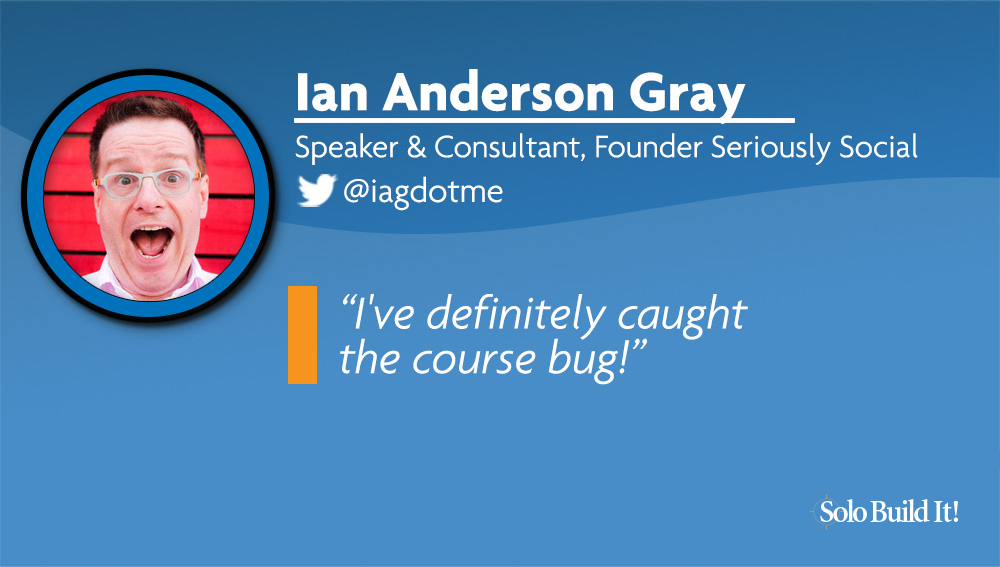 Ian Anderson Gray from https://iag.me
Ian Anderson Gray from https://iag.me
Speaker and Consultant, Founder, Seriously Social
What has been your most effective monetization technique, and why?
I deliberately didn’t look at monetizing my blog at the start. That wasn’t because I was rolling around in cash. Far from it! However, I wanted to concentrate on creating quality content and build up trust. Trust is everything! Growing followers and traffic was also important. Affiliate links have been useful, however launching a course has been my most effective monetization technique. I am passionate about teaching and training. The problem is, training one-to-one or on a group level isn’t very scalable.
So, just as I was moving house earlier this year, it seemed the perfect time to launch a course on Facebook Live! It wasn’t perfect at the start, but building the course was a lot easier than I anticipated once I got going. I quickly improved things and grow the platform. After I created the course and started promoting it, I was overjoyed to see the sales coming in. I’ve definitely caught the course bug!
What has been your least effective monetization technique?
I’m sometimes my own worst enemy. I’ve been too slow at working out the monetizing strategies for my blog and implementing them. The fact that it had taken me so long to launch a course is a case in point. I was really encouraged by how successful it was when it launched. However, it was almost as if people were saying “Finally! Ian’s launched something we can actually buy!”
The lesson is, at least for me, the least effective monetization technique is just not monetizing your skills and talents. We all have talents and skills. We just need to get off our backside and do something about it!
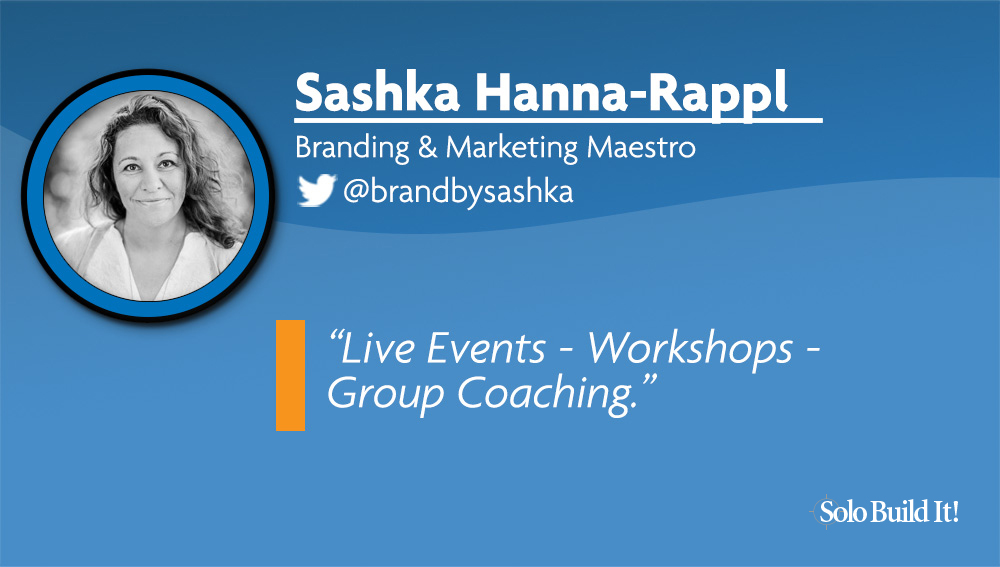 Sashka Hanna-Rappl of https://www.BrandSashka.com
Sashka Hanna-Rappl of https://www.BrandSashka.com
Branding and Marketing Maestro
What has been your most effective monetization technique, and why?
Live Events, Workshops, Group Coaching (Beta). You get to meet me live. Brand marketing and advertising and branding aren’t something you can just Challenge about… it’s deepset work that needs planning and organization.
This is done best in my live workshops as I conjure up mindblowing-blocks that have held back “established” entrepreneurs from creating and developing their brand. Too often the focus is on the “lack” or “wrong area”… and we all know (almost) that what you think and say you attract…
In my live events / workshops and group coaching, everyone has a different epiphany for each area I touch on, and they’re able to react quicker in live situations than in automated situations.
What has been your least effective monetization technique?
Challenges: The information is too educational, so “up there” that the link between one area and another isn’t easy to see. Building the know-like-trust with a Challenge has been less effective than, say, being visible and live in groups, answering in real-time.
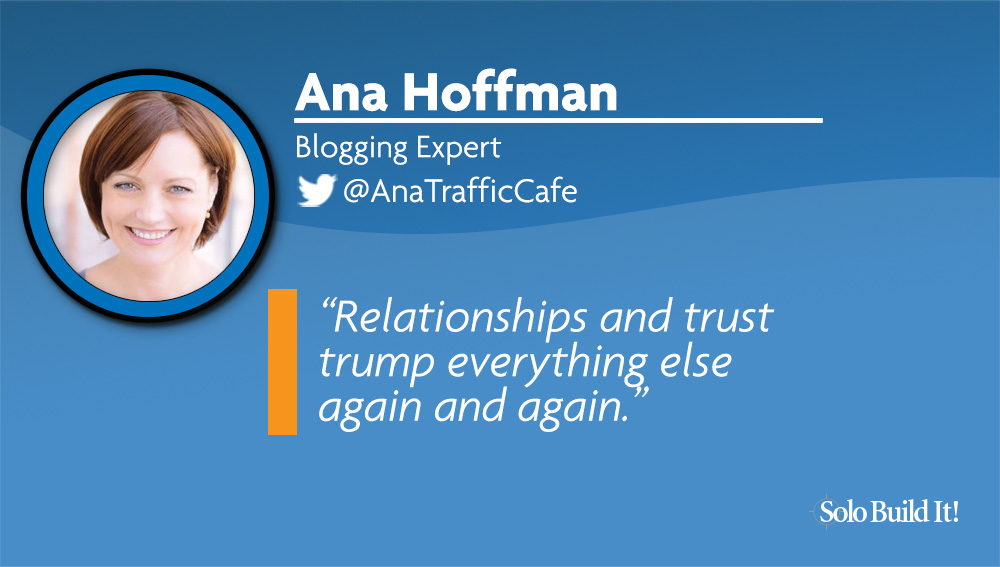 Ana Hoffman of http://www.TrafficGenerationCafe.com
Ana Hoffman of http://www.TrafficGenerationCafe.com
Blogging Expert
What has been your most effective monetization technique, and why?
My list is my biggest money-maker — relationships and trust trump everything else again and again.
What has been your least effective monetization technique?
Banner ads (paid or affiliate) have always been a waste of my blog real estate for me.
 Brent Jones of http://BrentJonesOnline.com
Brent Jones of http://BrentJonesOnline.com
Freelancer and Blogger
What has been your most effective monetization technique, and why?
Promoting affiliate links to courses or products that my readers would find useful has been somewhat effective for me. I position a product in my blog content or in a broadcast to my mailing list as a solution to a specific problem, and it typically generates a few sales. (So long as I don’t promote my affiliate links too often.) This is, in fact, the only way I currently monetize my blog… and I think it has been effective since I leverage existing trust I have with my audience.
What has been your least effective monetization technique?
Several years ago, I tried buying pay per click ads and solo ads to drive traffic to sales pages. No matter how targeted I thought the traffic was, my conversion rate was always poor. It taught me the importance of the old adage, “People buy from people they like and trust.”
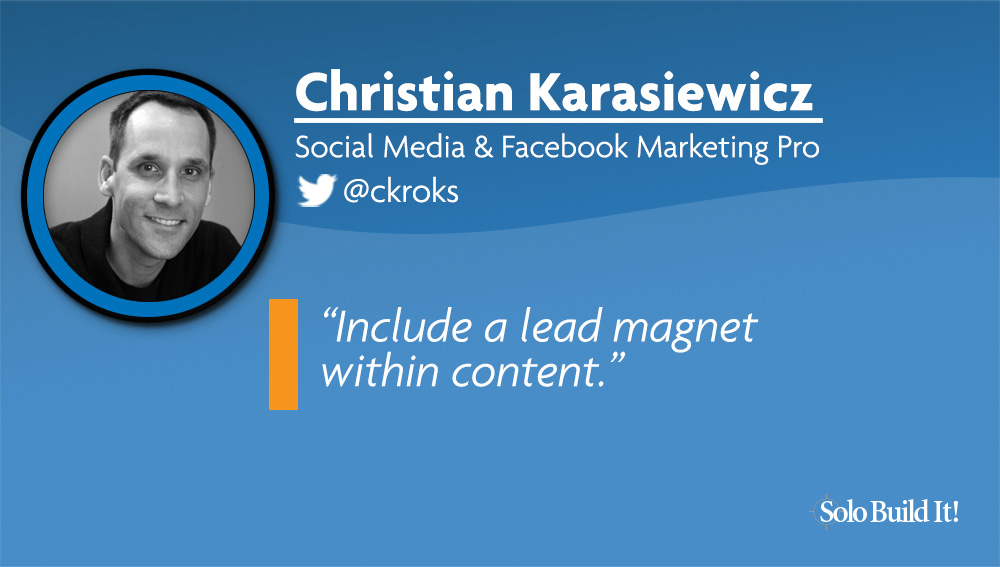 Christian Karasiewicz of http://www.SocialChefs.com
Christian Karasiewicz of http://www.SocialChefs.com
Social Media and Facebook Marketing Pro
What has been your most effective monetization technique, and why?
One of the most effective monetization techniques I have used is to include a lead magnet within content. Some examples include creating an eBook with additional bonus content or even something as simple as a PDF version of the blog post to download and read later.
Within the content, this is a good opportunity to provide an upsell for other programs and services that you offer, and in some cases, include affiliate links. If you decide to include affiliate links, be sure they are products you have used and personally recommend.
I’ve found that this technique tends to work well for monetizing content. Readers get a bonus with an article they are reading. At the same time, this helps to monetize the content so that you can continue to offer it for free.
What has been your least effective monetization technique?
My least effective monetization technique is to include too many banners from affiliate channels in the sidebar and in between the content. There’s no question, banners do work — in moderation.
Initially, I thought the more banners, the better. That didn’t turn out to be the case though. Not only did it not result in a lot of revenue, it made reading the blog content distracting. Imagine spending time writing a 1,000 word article, only to have the reader leave 250 words in because they got distracted by the shiny object you put in front of them.
Not only did having too many competing banner ads lose the reader, but they also didn’t get the message that I spent time writing.
After testing different banner placements on my site, I’ve found that less is more. If you do plan to include any banners with your content, consider ones that coincide with the post someone is reading. This can help reduce the number of shiny objects you put in front of readers and help keep them focused on the message in the content they are reading.
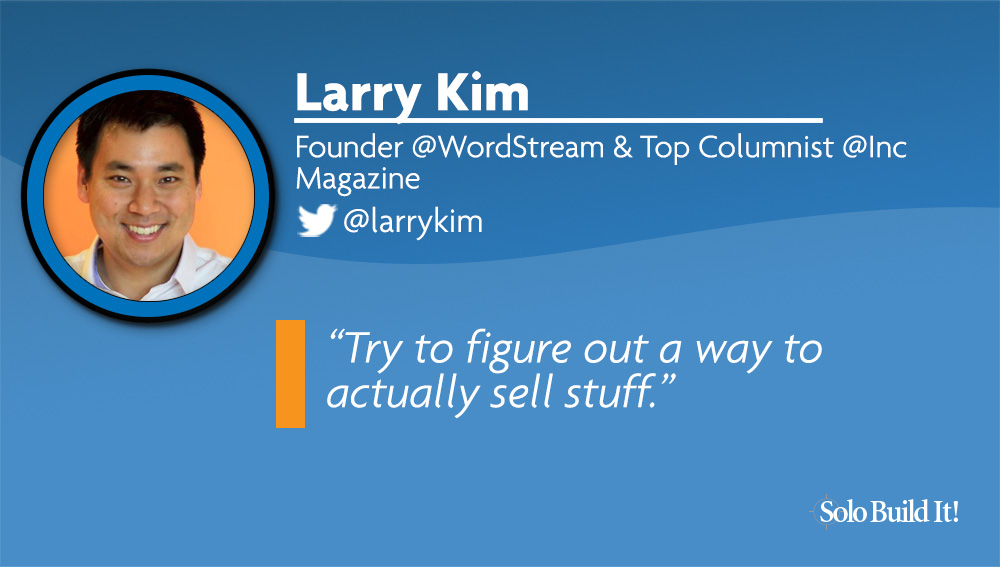 Larry Kim of http://www.Wordstream.com
Larry Kim of http://www.Wordstream.com
Founder, WordStream, Top Columnist, Inc. Magazine
What has been your most effective monetization technique, and why?
We drive millions of people to our blog and monetize the traffic by selling software and services (as opposed to selling ad space). Usually the margins on software are remarkably high. We sold tens of millions of dollars of software last year. So, I think bloggers hoping to monetize their blog traffic should try to figure out a way to actually sell stuff — ideally higher margin products rather than lower margin services.
What has been your least effective monetization technique?
Selling ad space at $5 CPMs or whatever a publisher gets these days isn’t really that interesting a business model in my opinion. There should be some end-game other than just selling banner ads. For example, I’m monetizing our traffic at a several thousand dollar CPM, by selling products.
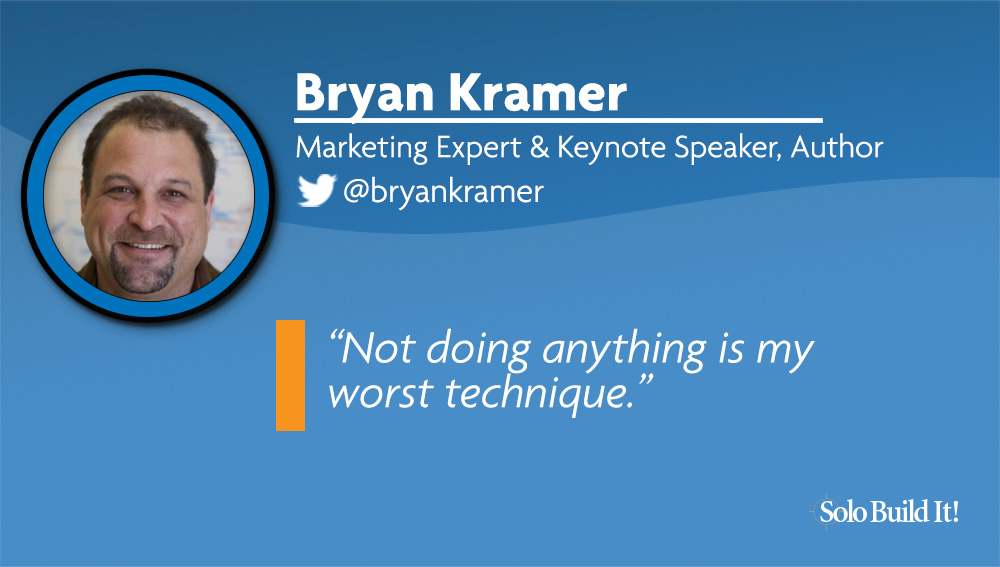 Bryan Kramer of http://BryanKramer.com
Bryan Kramer of http://BryanKramer.com
Marketing Expert and Keynote Speaker, Author
What has been your most effective monetization technique, and why?
I built a personal brand quiz that anyone can take and figure out within a couple minutes what kind of personal brand they are out of the six types identified in a New York Times-based study. This generated over 15k emails in several months. Eventually I offered a course for personal branding offered to these opt-ins, filling my course to capacity.
What has been your least effective monetization technique?
I know it sounds cheesy, but not doing anything is my worst technique. So many times we want to create something and never get to it. Simply doing nothing is my least effective approach.
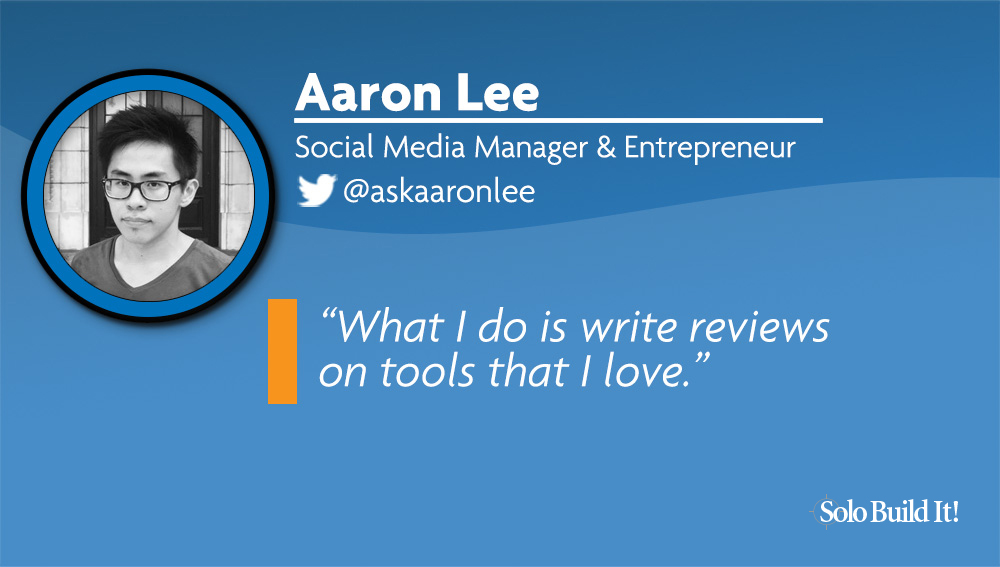 Aaron Lee of http://ShortOfHeight.com
Aaron Lee of http://ShortOfHeight.com
Social Media Manager and Entrepreneur
What has been your most effective monetization technique, and why?
The most effective monetization technique for my blog is through affiliate marketing. What I do is write reviews on tools that I love and that have helped me.
I figured that if it can help me, someone must be looking to see if it can help them too. A mistake many make is reviewing everything. That won’t convert readers into buyers because it doesn’t have that connection.
What has been your least effective monetization technique?
One of my least effective monetization technique is selling banner ads. Not only don’t I make much money from them, they can be quite a distraction. I now focus on promoting affiliates through banners instead of selling banner ads.
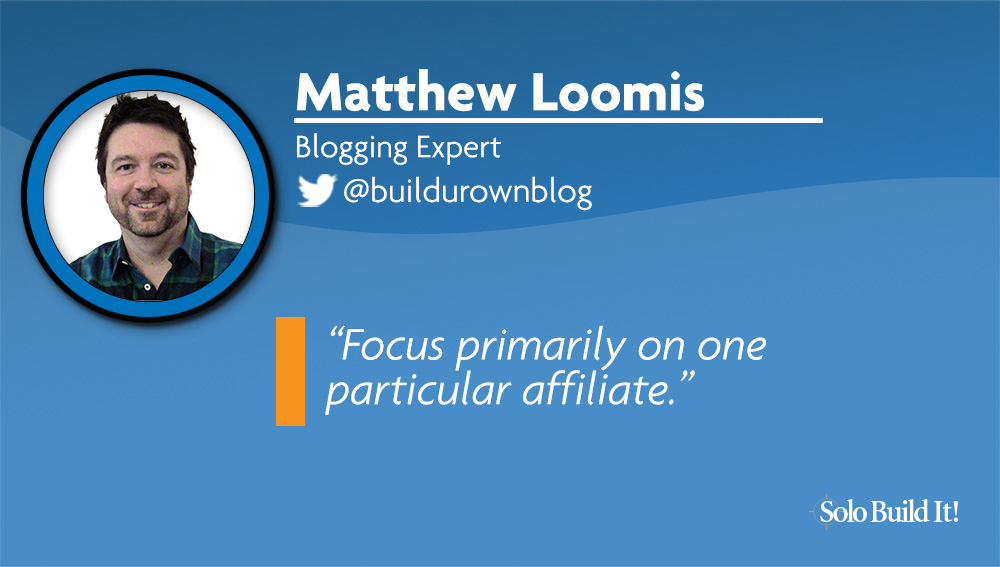 Matthew Loomis of http://www.BuildYourOwnBlog.net
Matthew Loomis of http://www.BuildYourOwnBlog.net
Blogging Expert
What has been your most effective monetization technique, and why?
So far for me, the most effective monetization technique has been to focus primarily on one particular affiliate and to build an entire business around that primary affiliate. That’s what I’m doing with Build Your Own Blog.
That domain name makes the purpose of the business crystal clear — you are at the site to learn about blog-building. So that’s why my partnership with the web hosting company Bluehost is the foundation. That’s where everything starts. You can’t have a self-hosted blog without a host.
My other partnerships are like extras. They are nice, but Bluehost gets most of the attention and resources. I don’t spread things too thin by trying to monetize in too many areas at once. This keeps the marketing message clear. All content created is in some way about building your own blog, and the other affiliates help people do that, but again, I stay primarily focused on the Bluehost funnel, and keep it my top priority.
What has been your least effective monetization technique?
This is going to sound funny but I have to say my least effective monetization technique has been giving away so much for free! LOL
That is something I want to change.
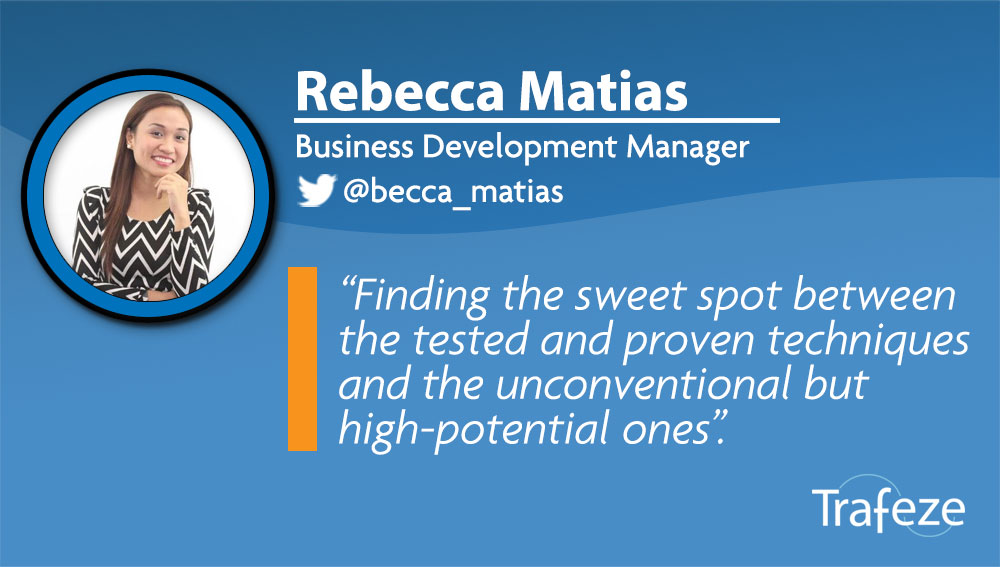 Rebecca Matias of http://www.CallboxInc.com
Rebecca Matias of http://www.CallboxInc.com
Business Development Manager
What has been your most effective monetization technique, and why?
Ours is an industry so competitive that the market is quickly becoming saturated with ROI ideas, both conventional and completely outside the box. The challenge is in finding the sweet spot between the tested and proven techniques and the unconventional but high-potential ones. When it comes to traffic monetization, event marketing through event management tools and social media has proven to be the most effective for us.
Case in point: The latest Dreamforce event I attended with our CEO, Rom Agustin. We saw Dreamforce as an opportunity for us and our old clients and new prospects to meet face-to-face and discuss the possibility of a partnership, so we hyped our presence in the event by publishing a series of blog posts, added calls to action (SCHEDULE AN APPOINTMENT NOW! Coffee’s on us.) in our Eventbrite page, and waited for the sign-ups. We’ve always done this since the first time we went to DF, with the response always hovering around 20 with a 20-30% sign-up rate (which is our target).
This year, however, we improved the content and were more aggressive and pervasive in social media. The result was an overwhelming 55 responses and 12 sign-ups. Although only five actually showed up and literally shared a cup of coffee with us, three signed contracts (two new, one renewal) right then and there.
What has been your least effective monetization technique?
On the opposite end of the effectiveness spectrum are our shareables — blogs and articles we publish on the website — which create awareness at best. While we cannot discount the possibility that they may generate leads in the future, the fact remains that they have almost zero ROI as of this writing.
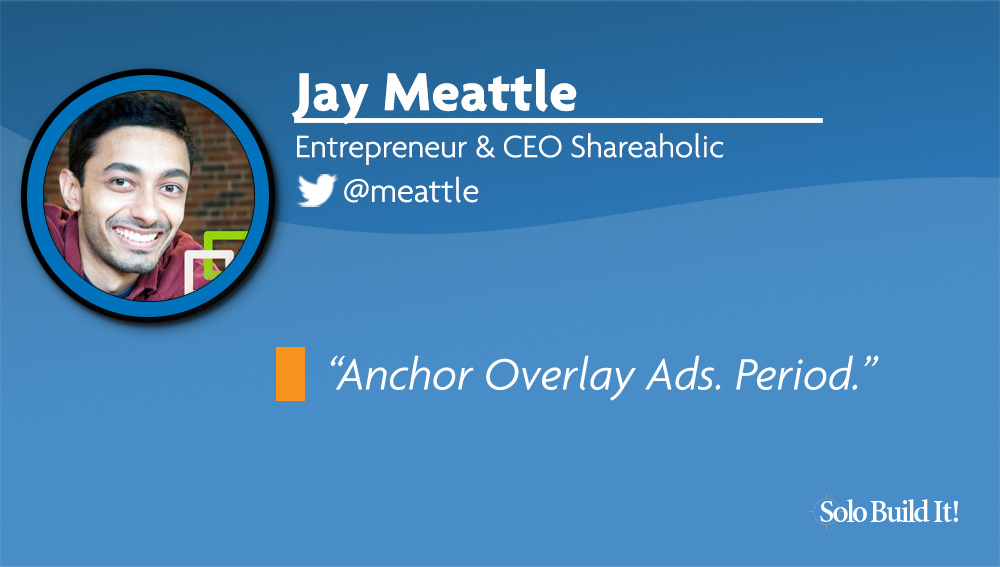 Jay Meattle of https://Shareaholic.com
Jay Meattle of https://Shareaholic.com
Entrepreneur and CEO, Shareaholic
What has been your most effective monetization technique, and why?
Anchor Overlay Ads. Period. Because they’re always in view, advertisers tend to pay 4x more for them vs. plain banner ads. Learn more.
What has been your least effective monetization technique?
Plain banner ads. They typically get ignored or lost on the page and usually are not worth it, unless one gives them prime placement.
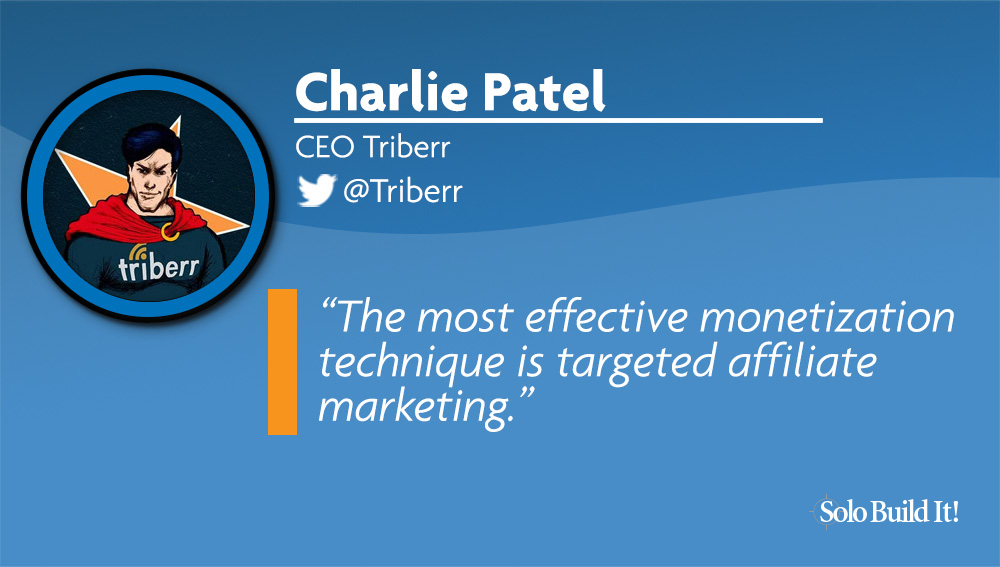 Charlie Patel of http://Triberr.com
Charlie Patel of http://Triberr.com
CEO, Triberr
What has been your most effective monetization technique, and why?
Across several blogs, the most effective monetization technique is targeted affiliate marketing or cross-promotion marketing. This works really well especially when you have very specific content catering to a well defined audience persona.
What has been your least effective monetization technique?
AdSense… What a waste! Unfortunately, ad networks simply do not work for blogs that don’t command significant traffic. Provided your blog serves a niche or a highly targeted audience, joint partnerships, digital products, and / or affiliate marketing typically generates more income than advertising networks.
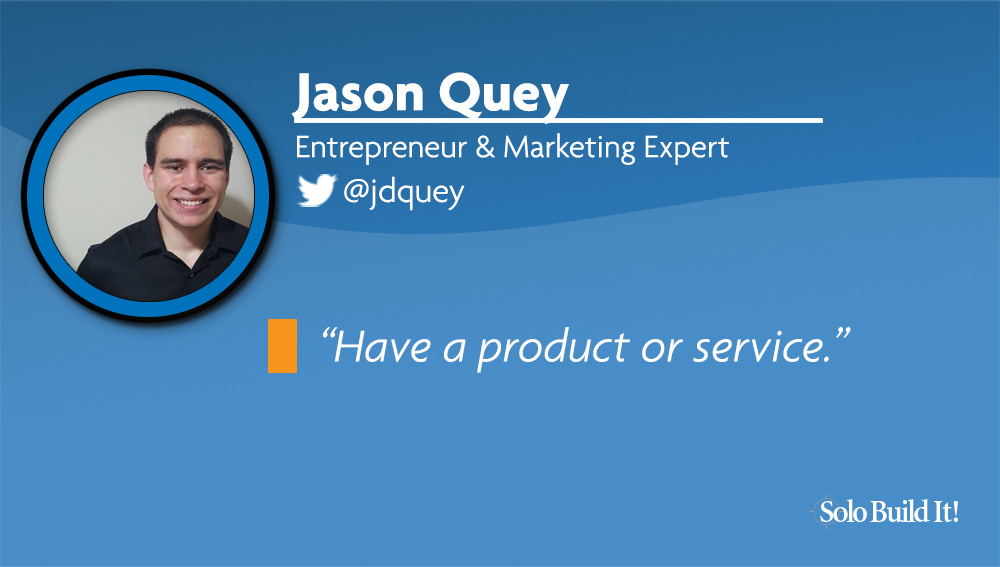 Jason Quey of http://www.TheStorytellerMarketer.com
Jason Quey of http://www.TheStorytellerMarketer.com
Entrepreneur and Marketing Expert
What has been your most effective monetization technique, and why?
My most effective monetization technique was to have a product or service apart from the blog. In itself, my blog is my lab to experiment with new ideas and as a portfolio of my knowledge and skill.
What has been your least effective monetization technique?
In eons gone by, in a past blog, I used to try Amazon affiliate links. Given how few people visited the blog, I quickly scrapped this idea.
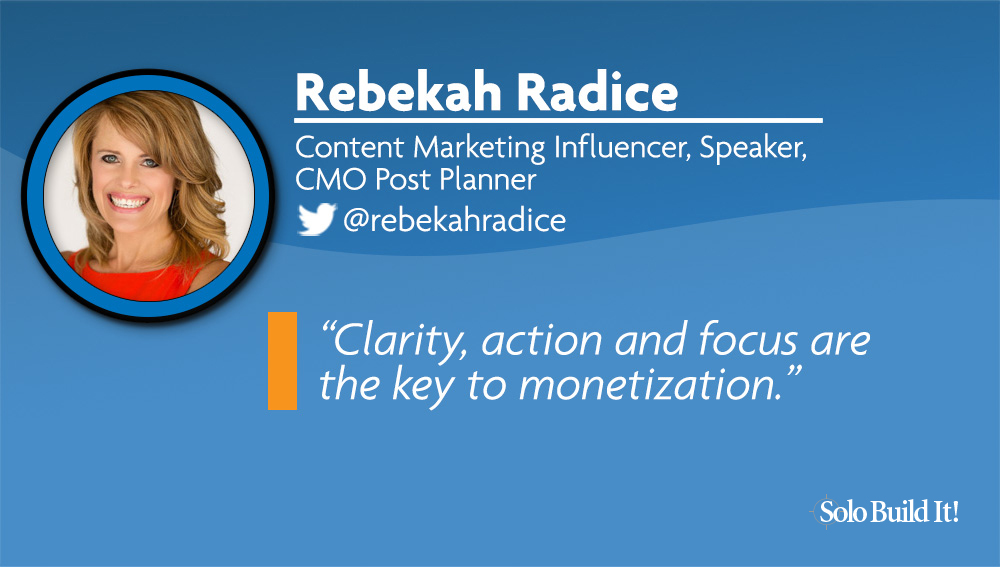 Rebekah Radice of http://RebekahRadice.com
Rebekah Radice of http://RebekahRadice.com
Content Marketing Influencer, Speaker, Chief Marketing Officer, Post Planner
What has been your most effective monetization technique, and why?
My number one most effective monetization strategy is and has been Inbound Marketing. This year I scaled my Inbound efforts by removing any ambiguity within my strategy.
I realized that the audience I had built wasn’t the audience I needed. My focus had shifted and so had the content I was sharing.
It’s important to re-evaluate the who and what of your business often. Whom you’re speaking with and what problem you solve.
If you haven’t taken the time to identify both of these in your business, I suggest the Lean Canvas within Running Lean. In 30 minutes time, you can articulate where your business is heading and why. Clarity, action and focus are the key to monetization.
What has been your least effective monetization technique?
My number one least effective monetization strategy was building an end-to-end social media training program.
For me, this strategy didn’t work for two reasons:
- The amount of time and effort vs. the ROI wasn’t there.
- My heart wasn’t into the upkeep required to maintain and grow a full-time training program.
It’s important to understand goals before diving into any strategy. While the experience was well worth it, selling the system proved to be the smartest move for me.
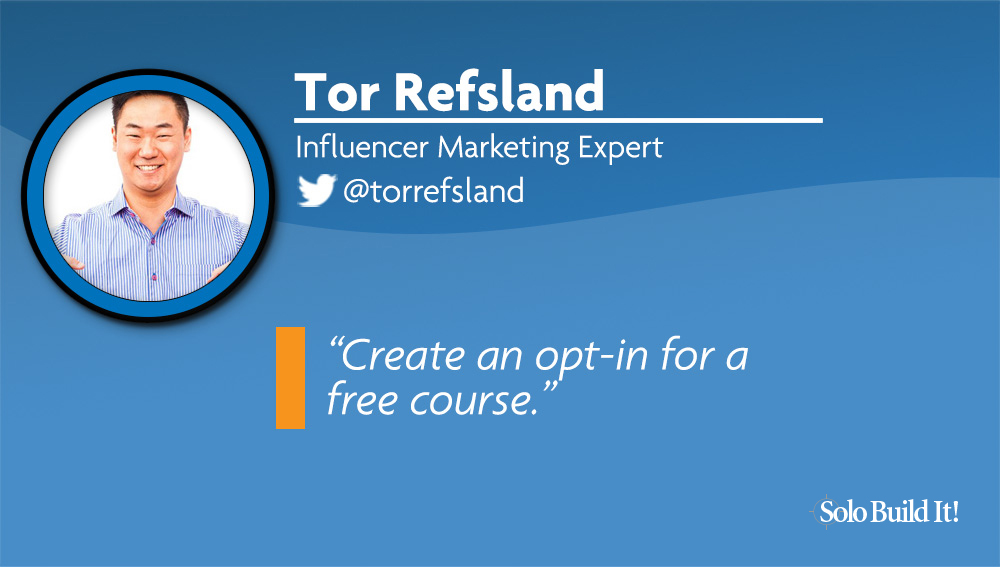 Tor Refsland of http://www.TimeManagementChef.com
Tor Refsland of http://www.TimeManagementChef.com
Influencer Marketing Expert
What has been your most effective monetization technique, and why?
Derek Halpern from Social Triggers talks about that before you create a digital product, you should create a free product to see if that is a topic people are interested in.
I was thinking: “That’s cool. But there is no way I am going to waste my time to create a free product, before I KNOW this is something people want.”
So I created something I call The Pre-Free Technique, which is basically to create an opt-in for a free course before I had created it.
I would say “Hey, I am going to launch a free course called X, and it will do this for you (insert Y). Limited spots, sign up now.”
My course was called How To Blog Outreach Like A Boss.
My goal was to get 100 subscribers on that targeted email list.
When I published my post using “The Birthday Technique,” I got the first 100 subscribers in 8 hours. Then I created them as a VIP list, and started a new waiting list.
When people got on my email list, I asked them for their biggest struggle about the topic and in which format they wanted the free course to be presented in.
And they told me.
In addition, I told them: “It’s going to be impossible for me to take everything that I knew about the topic and put into this free course.
“However, at the end of this course, you will have the opportunity to join my advanced course, where I will be sharing everything I know about the topic. And since you are a charter member, you will get access to it for a discounted price.
“I just wanted to be totally transparent about that.”
Then I pre-launched my course.
Long story short.
I created the free course for them, built a targeted email list of 777 subscribers in 3.5 months, pre-launched my product before I had created it, and made $6000 in sales.
What has been your least effective monetization technique?
To create the product without having validated it, and then trying to market it to my audience.
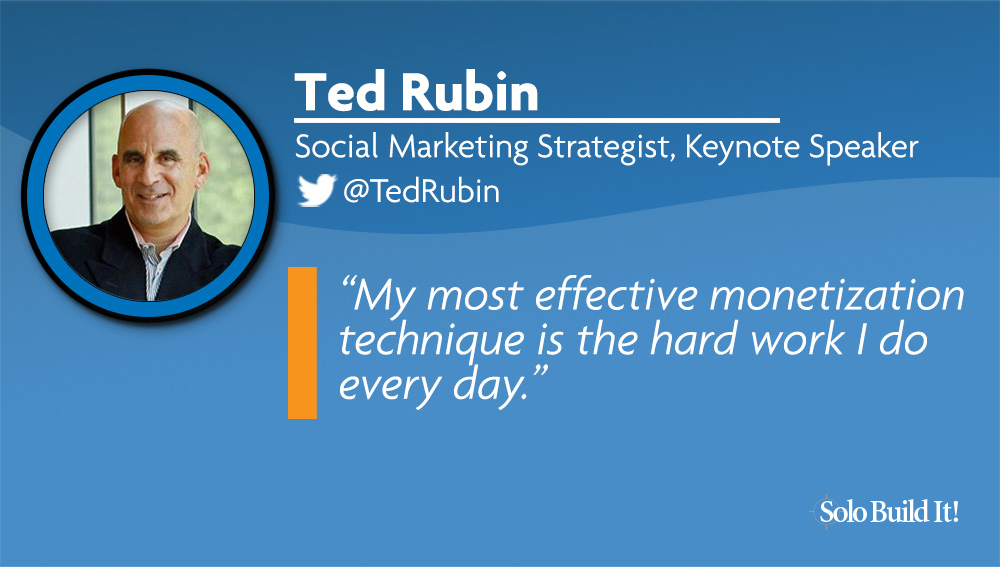 Ted Rubin of http://TedRubin.com
Ted Rubin of http://TedRubin.com
Social Marketing Strategist, Keynote Speaker
What has been your most effective monetization technique, and why?
My most effective monetization technique is the hard work I do every day publishing, syndicating that content, engaging, building relationships… and framing/extending my personal brand.
What has been your least effective monetization technique?
The least effective monetization technique I have found is hoping others will do that work for me.
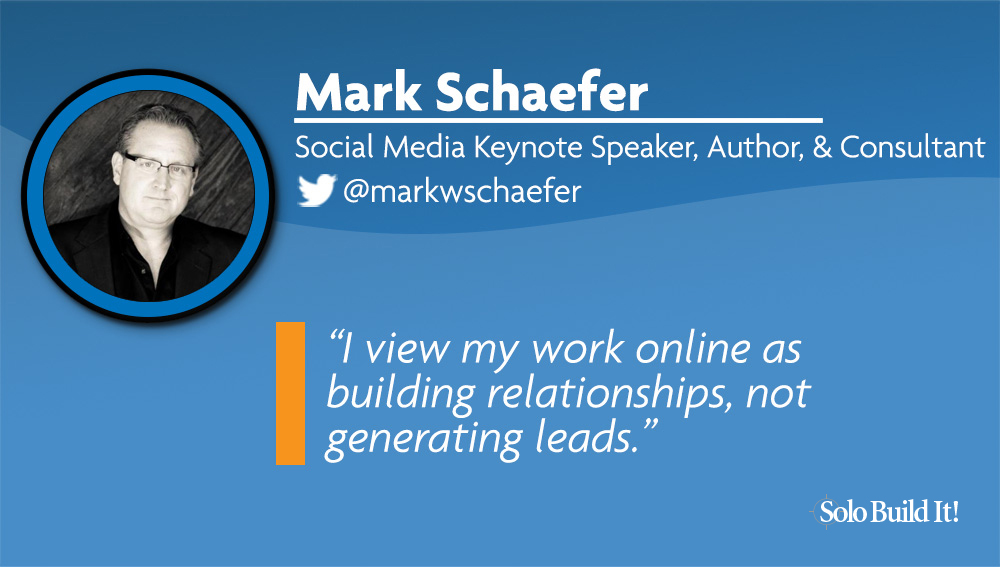 Mark Schaefer of https://www.BusinessesGROW.com
Mark Schaefer of https://www.BusinessesGROW.com
Social Media Keynote Speaker, Author, and Consultant
What has been your most effective monetization technique, and why?
I view my work online as building relationships, not generating leads. So this is an “indirect” method of monetization that is based on building trust and authority. That takes time, but it is really the only method that works to attract the big-brand clients I work with. Before they hire me as a speaker or strategist, they really have to know me and trust me. It’s a very personal decision. That takes time, and that’s what I accomplish through my content.
What has been your least effective monetization technique?
For awhile I added an option on blog posts to provide a supportive donation through Patreon — you know, maybe a buck or two a month. I think my content provides that kind of value and I gladly support the work of others in this way. But a very low number of people responded. I’m not sure what kind of message that sends other than people just want stuff for free, even if I am pouring my heart into it every day!
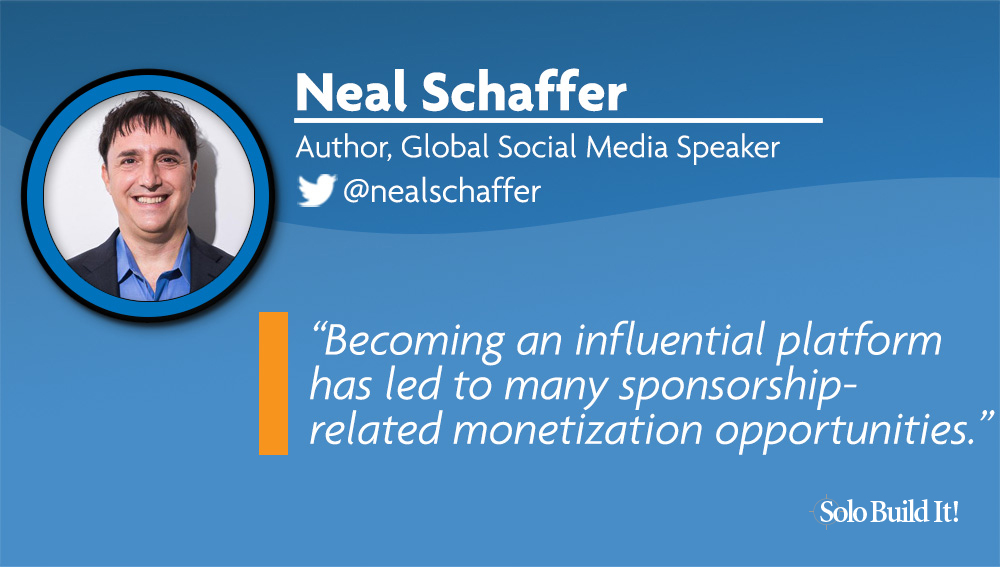 Neal Schaffer of http://MaximizeSocialBusiness.com
Neal Schaffer of http://MaximizeSocialBusiness.com
Author, Global Social Media Speaker
What has been your most effective monetization technique, and why?
Becoming an influential platform has led to many sponsorship-related monetization opportunities that have become, by far, the most effective in monetization.
What has been your least effective monetization technique?
Simple affiliate marketing display ads. Low CTR and even lower conversion.
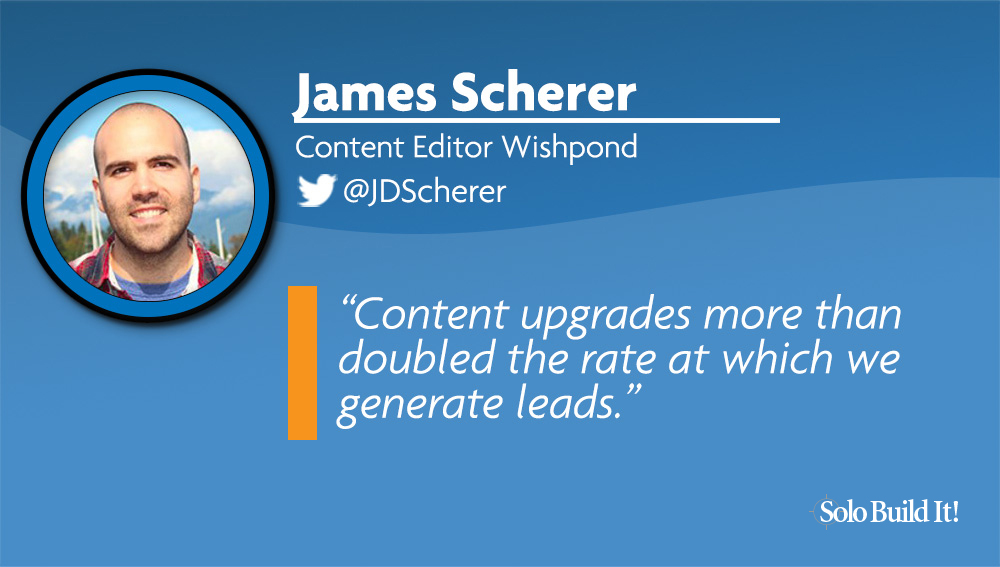 James Scherer of https://www.Wishpond.com
James Scherer of https://www.Wishpond.com
Content Editor, Wishpond
What has been your most effective monetization technique, and why?
Article-specific content upgrades more than doubled the rate at which we generate leads from our blog.
Editor’s Note: Content Upgrades are when you create a piece of content and then offer readers a related piece of content to be emailed to them. It might be a checklist, swipe file, PDF version of the article, or something else along those lines.
Previously we’d been embedding image CTAs into the bottom of articles to drive readers to relevant, email-gated ebooks on a separate landing page.
Content upgrades outperformed ebooks for a couple primary reasons:
- They’re hyper-specific: Each content upgrade is written for the article it’s embedded in — even if it’s just a downloadable PDF of the article (and those work better than you’d think).
- They keep the reader on page: Each inline content upgrade CTA triggers a click popup, which allows readers to submit lead information, then download and access the content upgrade without being sent to a new tab. This results in a serious reduction in friction.
Another strength is that content upgrades (being more specific than ebooks) have allowed us to segment leads by interest more effectively. This has significantly increased the lead-to-signup conversion rate of our drip campaigns.
What has been your least effective monetization technique?
We’ve had a hell of a time monetizing our old email list.
We started generating contacts through signup in 2011, but until 2013, didn’t recognize how important segmentation was going to be down the line. Every subsequent attempt at retroactive segmentation has proven frustrating.
This makes upselling pre-2013 clients difficult. And, as many of them are on grandfathered accounts there’s a lot of possible revenue there.
As our software has developed and our tools have become more integrated with each other, it’s become more and more challenging to recognize what older users might be most interested in and frame upsell messaging to those interests.
We’ve tried progressive profiling (gated content that asks for lead information we don’t have) but engagement rates among existing users on non-blog, non-product content have been less than promising.
Editor’s Note: Gated Content refers to pieces of content that cannot be accessed without first providing your email address (opening the gate).
We’ll keep trying, of course. Perhaps a product-based incentive or in-dashboard scroll bar prompting feedback.
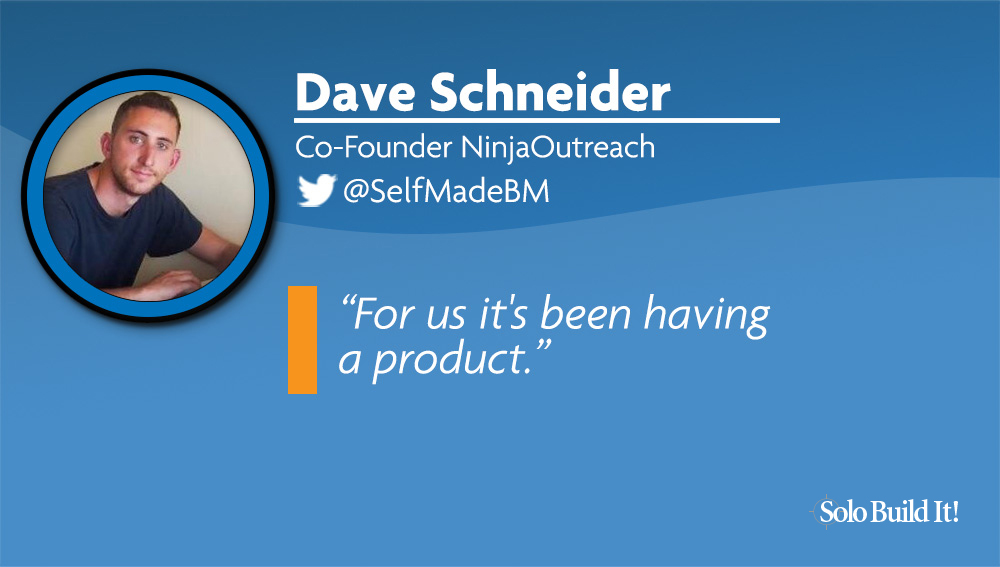 Dave Schneider of https://NinjaOutreach.com
Dave Schneider of https://NinjaOutreach.com
(Update – Dave no longer runs NinjaOutreach, but can be found at lesschurn.io and daveschneider.me).
What has been your most effective monetization technique, and why?
For us it’s been having a product. That’s why people know NinjaOutreach. Although we have services and affiliate sales, having our own product that actually provides value to people and allows them to get a job done is the reason why people pay us.
What has been your least effective monetization technique?
We’ve never found a lot of success with affiliate links. It’s one thing to just stick them in posts and it’s another thing to make significant money from them. I think you have to dedicate a lot of effort to promoting and showing the value of them to really get traction in that area.
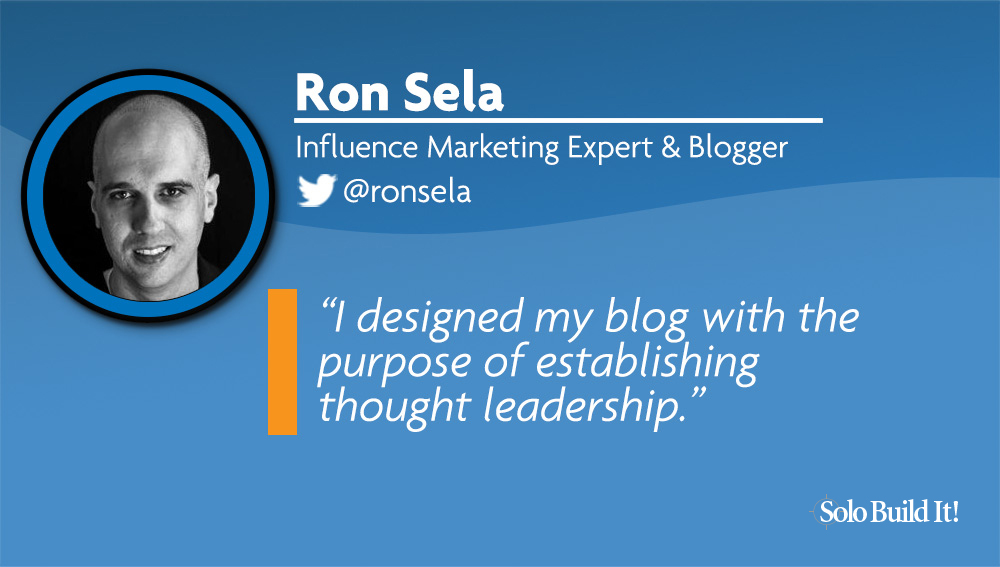 Ron Sela of http://www.RonSela.com
Ron Sela of http://www.RonSela.com
Influence Marketing Expert & Blogger
What has been your most effective monetization technique, and why?
My blog’s most effective monetization technique has been selling my consulting services to up and coming startups and small businesses. These ventures have a goal of increasing their brand visibility on the Internet and social media platforms.
I designed my blog with the purpose of establishing thought leadership. The ideas and information are beneficial in more ways than presentation. It is a valuable component of the customer acquisition process. The blog also assists with funneling potential clients to the relevant offer.
The combination of blogging and providing consulting services accelerates the sale of digital products specific to my field of knowledge. Providing the opportunity to buy my products and allowing customers to work the programs in a do-it-yourself manner opens a venue for the clients who do not want to pay for the entire consulting program.
What has been your least effective monetization technique?
The least efficient monetization technique I’ve tested has been putting advertisements on the blog. Advertisements were initially placed with the thought that passive income would be made through blog traffic. The expected results were not the actual outcome. The average pay rate of advertisements is minimal.
It may seem like small earnings can add up, but the next problem usually outweighs some extra change in the account. Blogs are used to captivate and hold the attention of the audience; this is not an easy accomplishment. When ads are placed alongside the blog content, it’s a monetization contradiction at its finest.
Advertisements are created to cause a distraction, thus putting them on your blog translates to an interference of your business presence. Blog ads make a site appear unprofessional, and internally the ads are often taking money out of your pocket long before they ever pay back.
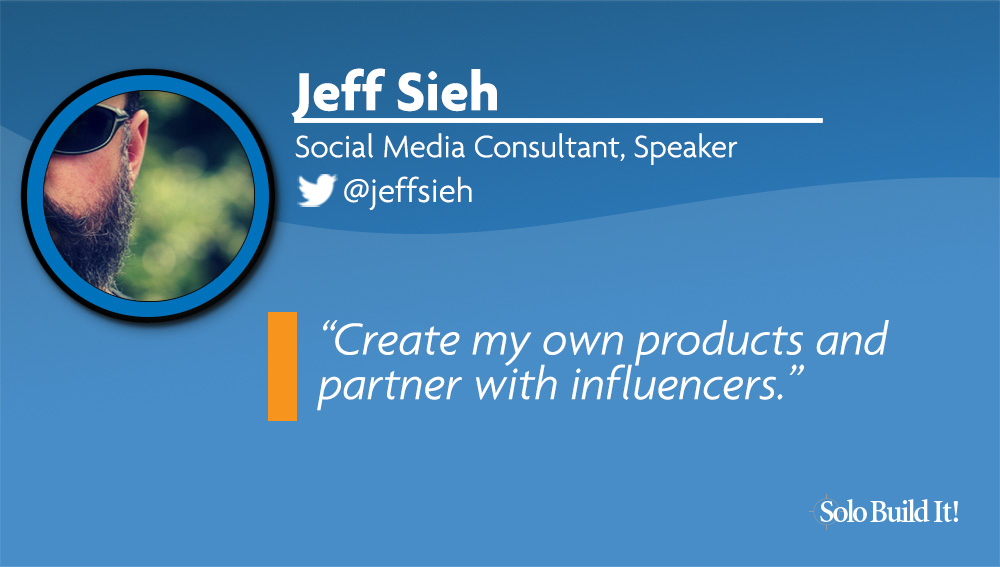 Jeff Sieh of http://ManlyPinterestTips.com
Jeff Sieh of http://ManlyPinterestTips.com
Social Media Consultant, Speaker
What has been your most effective monetization technique, and why?
My blog originally started out to increase exposure and to help with landing consulting and speaking engagements. Having a blog and a podcast that ties into that blog has helped land me opportunities working with companies like Social Media Examiner and speaking at their events.
That has led to increased opportunities to create my own products and partner with influencers in similar markets.
What has been your least effective monetization technique?
The least effective monetization techniques have been affiliate links. However, with increased exposure that is starting to rise.
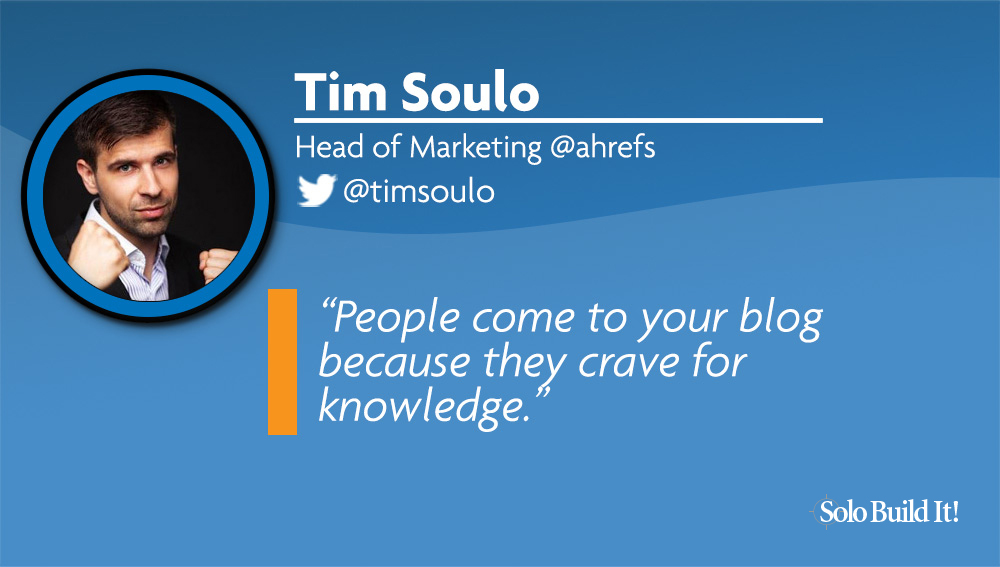 Tim Soulo of https://ahrefs.com
Tim Soulo of https://ahrefs.com
Head of Marketing, @ahrefs
What has been your most effective monetization technique, and why?
The most effective blog monetization technique is obviously launching an info-product. Because think about it — people come to your blog because they crave knowledge — and thus the best thing you can sell them is more (or deeper) knowledge on the topic that is of interest to them.
What has been your least effective monetization technique?
Banner ads. They only bring you money if you’re doing millions of pageviews per month. But even with millions of pageviews there are dozens of monetization strategies that will bring you much more money than banner ads.
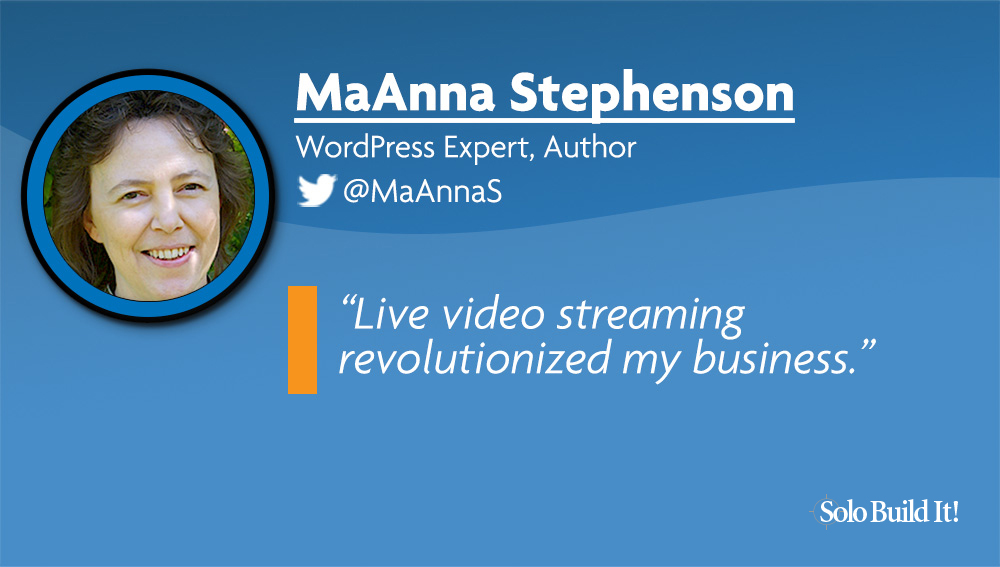 MaAnna Stephenson of http://www.BlogAid.net
MaAnna Stephenson of http://www.BlogAid.net
WordPress Expert, Author
What has been your most effective monetization technique, and why?
Live video streaming revolutionized my business. It is the most powerful, authentic, and transparent way to engage directly with my audience.
What has been your least effective monetization technique?
Lack of segmentation in my email list. Sending targeted emails to interested prospects is much more profitable.
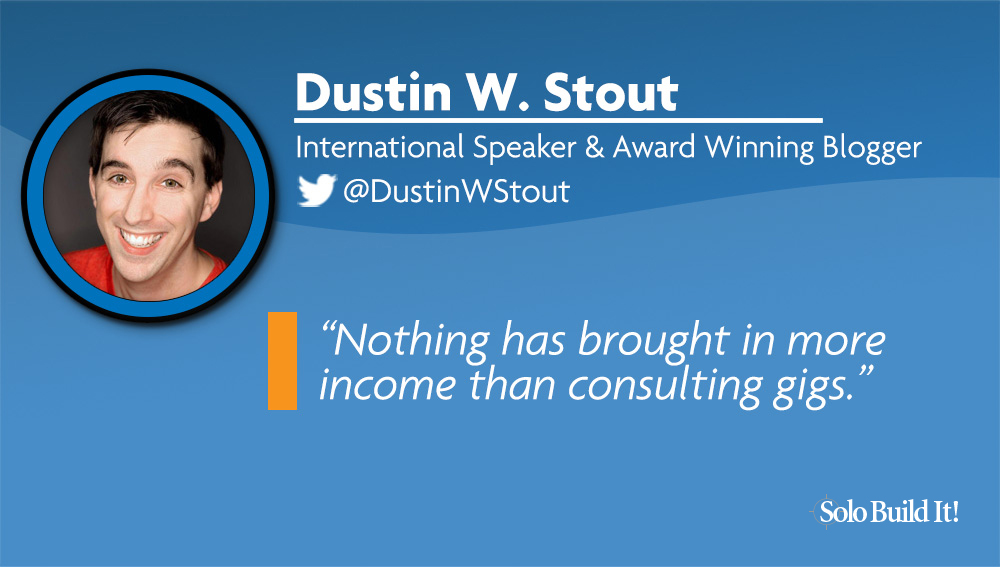 Dustin W. Stout of https://Dustn.tv
Dustin W. Stout of https://Dustn.tv
International Speaker and Award-Winning Blogger
What has been your most effective monetization technique, and why?
Selling my consulting services has been, by far, the most profitable monetization technique for my blog. I’ve sold products, sold advertising, and done affiliate marketing, but nothing has brought in more income than consulting gigs.
What has been your least effective monetization technique?
The least effective technique for me has been AdSense. My blog just never had the overwhelming traffic volume to make PPC ads worthwhile.
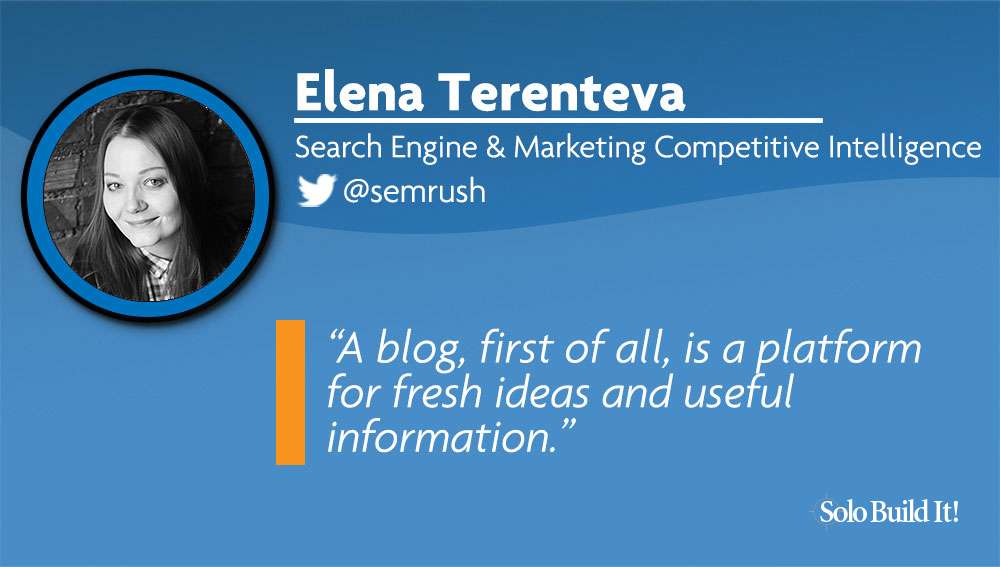 Elena Terenteva of https://www.SEMRush.com
Elena Terenteva of https://www.SEMRush.com
Search Engine and Marketing Competitive Intelligence
What has been your most effective monetization technique, and why?
The tactic that works best for us — do not try too hard to make money through the blog. Because a blog, first of all, is a platform for fresh ideas and useful information, not for pushy advertising campaigns. If users come to your blog for value, the best decision would be to give it to them.
My favorite example from SEMrush blog: we created The Ultimate Guide to Twitter Chats in order to attract more attention to our Social Media tool (#semrushchat is one of the biggest in the industry, so we decided to share our experience on building it) and we offered a full PDF version of the guide in exchange for an email address.
There was two signup forms on the blog — one was placed on the main page of the blog, the other at the end of each blog post. We were quite surprised to see that in three months the Twitter chat guide blog post’s sign up form gave us 27% of all subscriptions. It was a very successful campaign and proved that blog can become an important channel in the conversion funnel.
What has been your least effective monetization technique?
The least effective technique is the opposite of offering value — direct sales. Links to the Prices page, blog posts about some SEO 101 tips with links to the tools all over it. Along with low conversion rates, it’s hurting our reputation and decreasing audience loyalty. Combined together, these two factors make direct sales one of the most expensive monetization techniques.
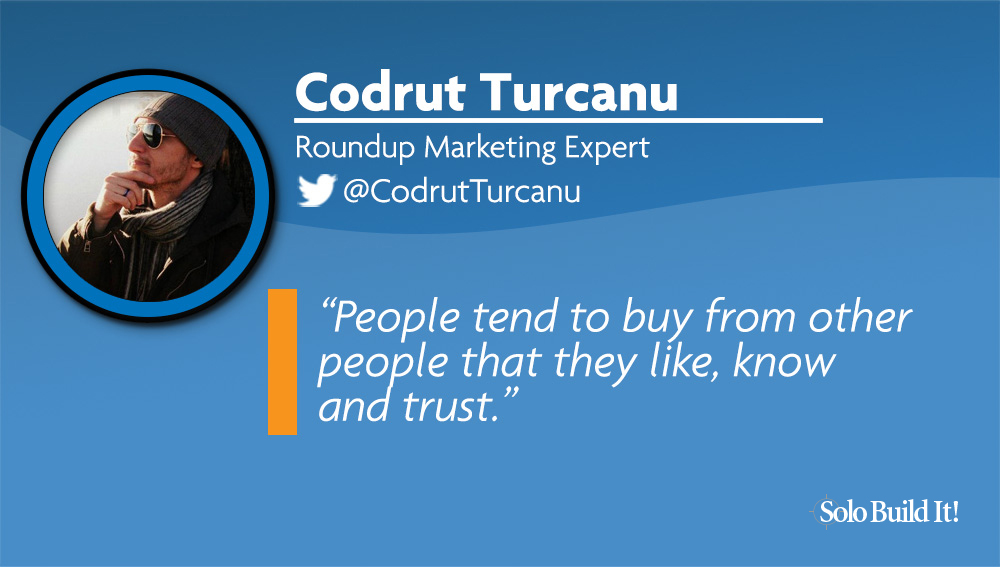 Codrut Turcanu of http://www.BestExpertRoundups.com
Codrut Turcanu of http://www.BestExpertRoundups.com
Roundup Marketing Expert
What has been your most effective monetization technique, and why?
My mailing lists. Because people tend to buy from other people that they like, know and trust.
A mailing list is a database of leads you can nurture over time and form a relationship with. Long term. It pays dividends.
What has been your least effective monetization technique?
My least effective monetization technique was cold-calling, offering my expert roundup and copywriting services to people who didn’t know me or whom I didn’t research in advance.
Cold calling works if you make it work. Get to know your leads. Interact with them. Offer your help. Some may ask for your pricing.
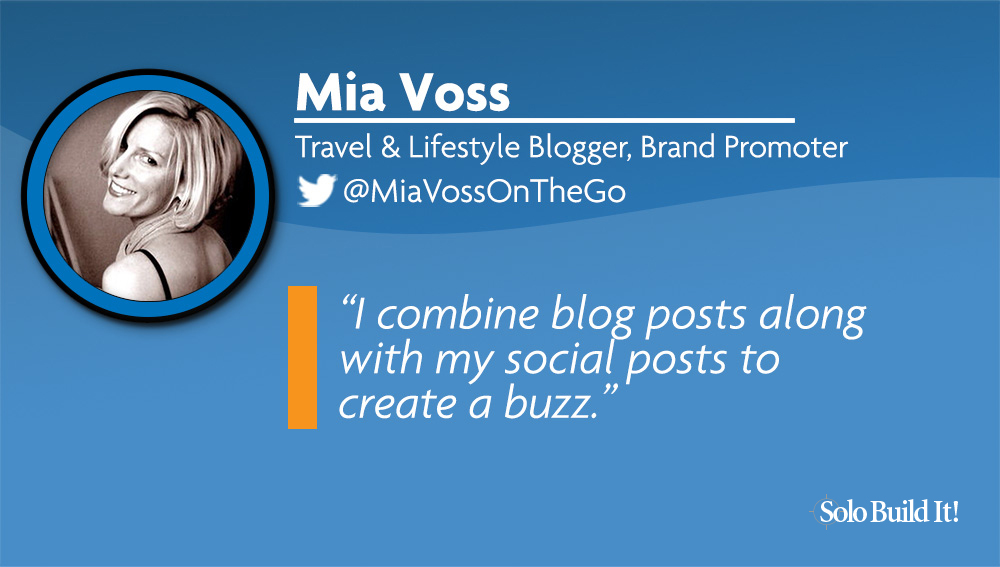 Mia Voss from http://MiaOnTheGo.com
Mia Voss from http://MiaOnTheGo.com
Travel and Lifestyle Blogger, Brand Promoter
What has been your most effective monetization technique, and why?
I combine blog posts along with my social posts to create a buzz for my travel adventures, which attracts brands that want to collaborate with me!
What has been your least effective monetization technique?
I haven’t really played around with the traditional monetization route such as ads etc. so I don’t have anything that’s a no go. 🙂
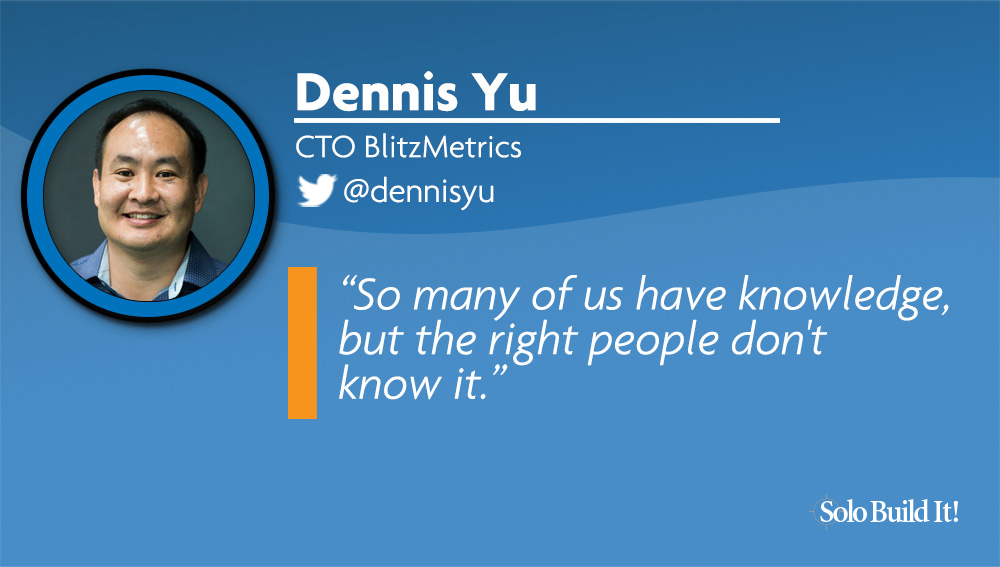 Dennis Yu of https://www.Dennis-Yu.com
Dennis Yu of https://www.Dennis-Yu.com
Chief Technology Officer, BlitzMetrics
What has been your most effective monetization technique, and why?
My most effective monetization technique has been the “dollar a day” approach on Facebook, which is micro-targeting to influencers using Facebook ads. So many of us have knowledge, but the right people don’t know it.
We discuss it here: www.digitalmarketer.com/podcast/facebook-boosted-posts/
What has been your least effective monetization technique?
Least effective were the two times that we paid for conference sponsorships. Even though it drove us a lot of in-person and online visits, we had to spend a lot of time repeating the same bits about what we do and qualifying clients. In essence, we had to give out free consulting. By boosting your articles, you’re letting Facebook share your knowledge instead of having to repeat yourself.
Monetization Analyzation
There you have it. Over 50 pieces of advice and anecdotes from some of the best and brightest blogging minds on the planet.
First of all, if you’ve made it this far, congratulations! You’ve just read a Master’s course on monetization, and you’re full of ideas and excitement for where your blog or business will be heading.
To help with your takeaways, we wanted to review some of the key points that were mentioned, and do a little analysis on the resulting answers. Ready?
Most Effective Monetization Techniques
Now, as we mentioned earlier, these experts represent a wide array of bloggers and online businesses, all of them with their own goals and models. “Monetization techniques” therefore had different meaning to each.
Here’s how the answers for ‘Most Effective’ played out:

Most of the experts cited Products, Email Marketing or Courses as their most effective technique for monetization.
What’s interesting is that for information-based businesses, it’s easy and natural to combine all three of those, isn’t it?
A course, technically, is a product, and once you’ve developed an email list of interested subscribers, you can market and monetize that course. That’s something that Tor Refsland talked about, specifically.
He said that he pre-launched his course by inviting interested people to subscribe, surveyed them, then built both a free course (as promised) and a more advanced course that was fee-based.
As you read and re-read the techniques outlined above, it’s that kind of synergy that you want to look for. Combine multiple techniques and approaches to create revenue streams that are lucrative and sustainable.
Least Effective Monetization Techniques
As for least effective, well, that wasn’t even close.

Nobody likes banner ads.
I did find the recurring theme of Lack of Focus particularly interesting. It’s something we talk about a lot within the SBI! Action Guide, and I’ve mentioned before as part of the Blogger’s Mindset.
Businesses and bloggers have to be focused. They have to do their homework and make sure that they’re reaching the right niche with the right information or product at the right time. The same is true with your monetization strategy.
I hope that these suggestions from an incredibly diverse and successful group of marketers, business owners and content creators will help you achieve the kind of focus and improved monetization you deserve.
Again, I encourage you to have this entire resource emailed to you for further study:
Leave a comment below with your favorite expert or advice, and be sure to share it with your friends and social community.
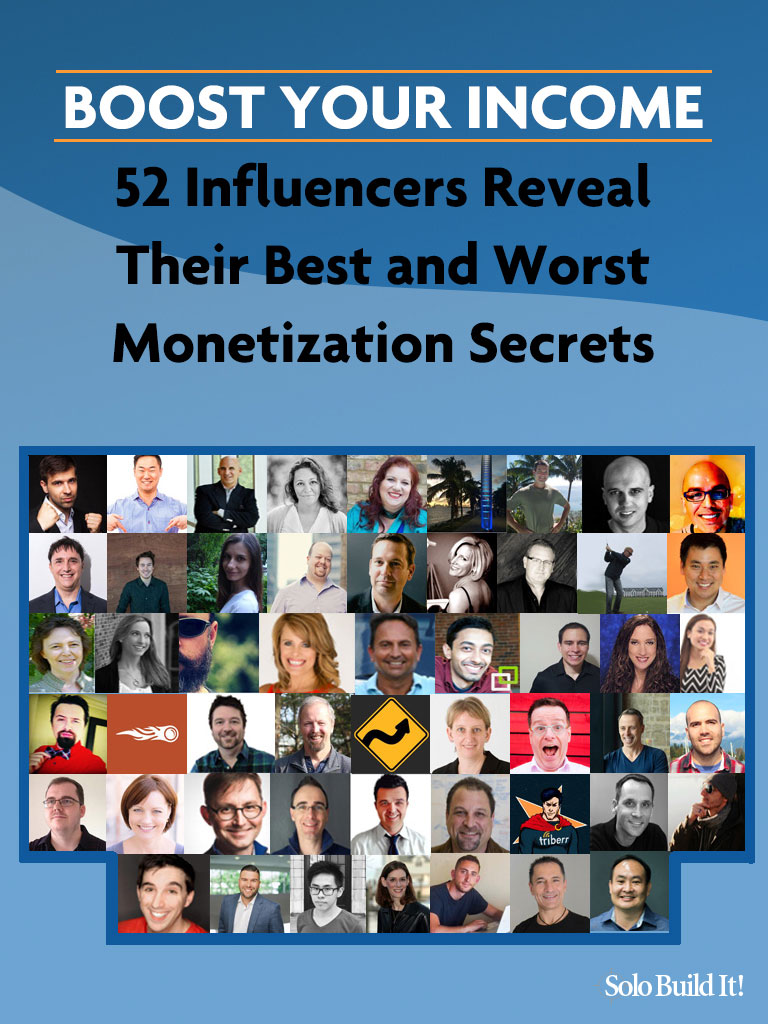
Latest posts by Mike Allton (see all)
- How to Avoid Failure in an Entrepreneurial Business - September 23, 2019
- How to Use Buffer for Social Media Management: The Solopreneur’s Guide - September 15, 2019
- Wix Review: An In-Depth Comparison of 10,000 Websites - September 1, 2019



